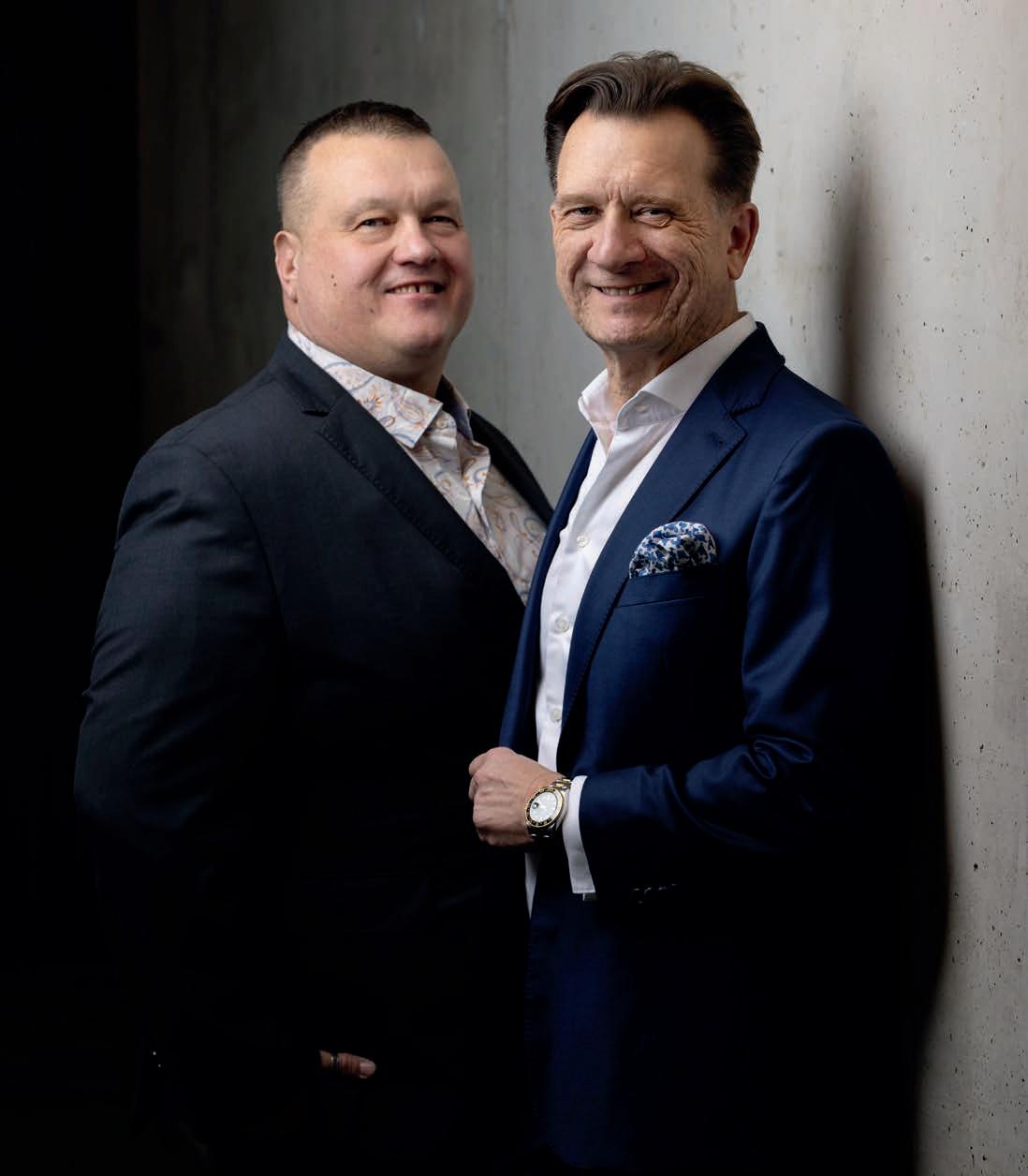
Visit us online For daily news visit us at wbj.pl FEBRUARY - MARCH 2024 ~ No. 1 (83) MODERN MOKOTÓW: TRANSFORMING WARSAW'S CITYSCAPE WITH SUSTAINABLE URBAN LIVING POLAND: EUROPE'S FUTURE INVESTING, ESG, REAL ESTATE, TALENT: THE PILLARS OF PROGRESS WARSAW YEARS BUILDING SUCCESS Neo Świat Founders Rajmund Węgrzynek & Paweł Brodzik Discuss Entrepreneurship, Values, and Navigating Poland's Real Estate Market in a Transformative Year
INTERVIEW
EXCLUSIVE

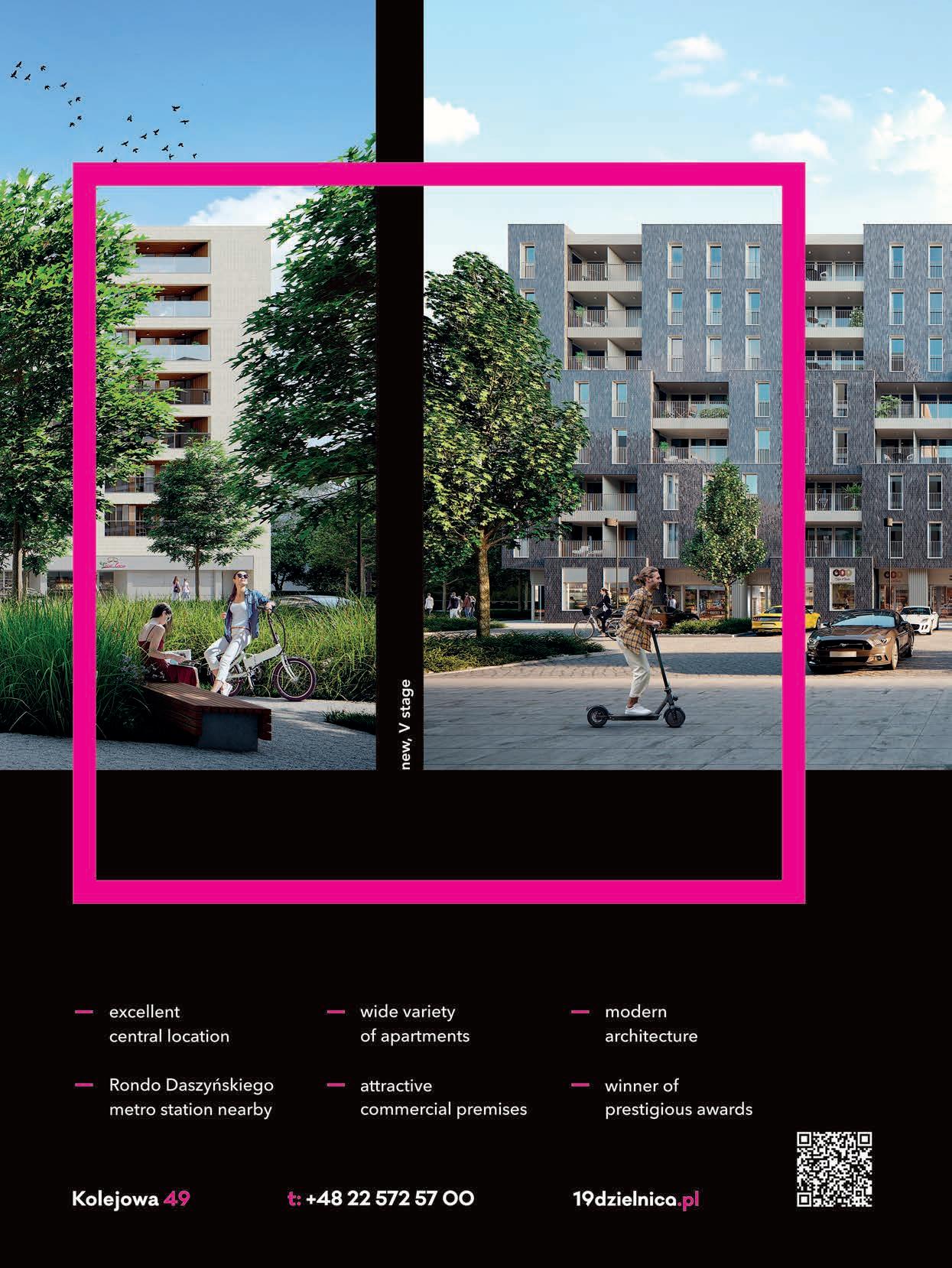
50

46


60


59
8 In Review News
12 Opinion
Elections in Poland spark changes in political scene by Sergiusz Prokurat
16 Exclusive Interview
Neo Świat Founders Rajmund Węgrzynek & Paweł Brodzik by Morten Lindholm
23 Poland: Europe's Future
35 Lokale Immobilia
News
CEE & SEE Summit in London
46 Feature
Tourism on the rise in Poland by Sean Reynaud
Interview: Sonam Parashar by Beata Socha
55 Tech News
59
64 Events
2 FEBRUARY - MARCH 2024 WARSAW BUSINESS JOURNAL
/MAR
FEB
Life + Style Spring is in the bag
23
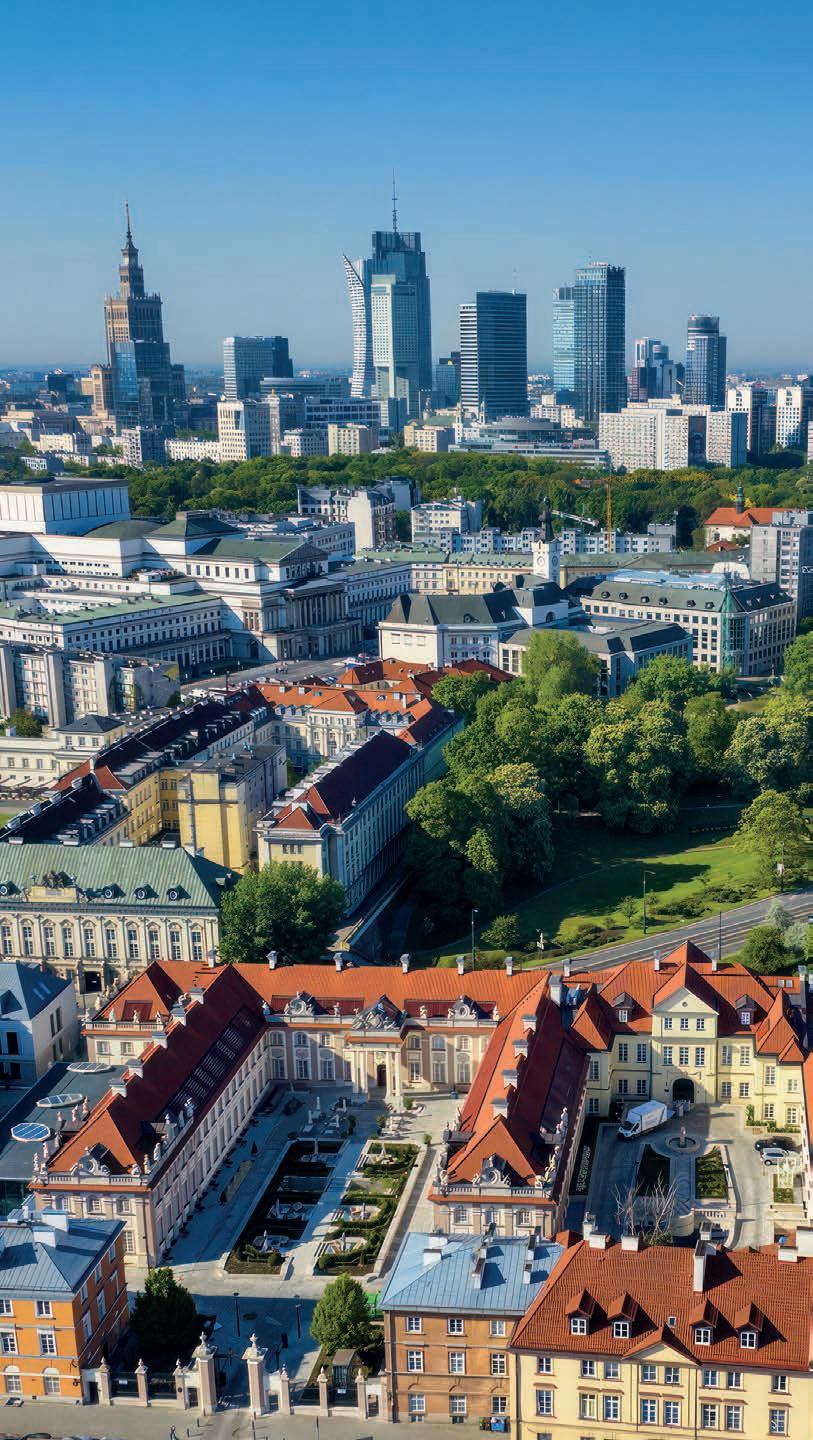
MIPIM 2024 Visit Warsaw AT STAND R8.D1 Our Partners at MIPIM 2024: GROW WITH WARSAW Smart People. Smart Technology. Smart City. um.warszawa.pl
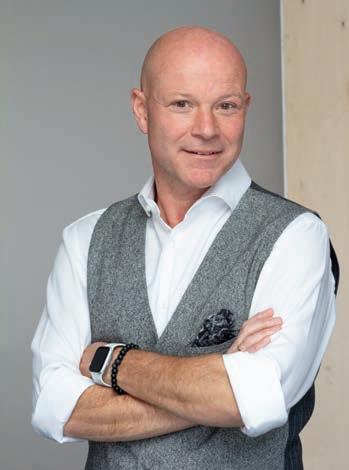
CHARTING POLAND'S ASCENDANCY
During my 25-year tenure in Poland, I've witnessed the country's remarkable growth in all facets of life. I've had the privilege to interact with ambitious, talented, and hardworking Poles. This journey has exposed me to promising business prospects, remarkable financial development, and an improvement in living conditions for urban communities across Poland. These experiences have left an indelible impression on me, one that continues to inspire me today.
This personal journey, supplemented by compelling data and facts, highlighting Poland's impressive growth over the last 30 years, has served as the driving force behind our celebration of the 30th anniversary of the Warsaw Business Journal under the theme 'Poland: Europe's Future.' We firmly believe that Poland will be the catalyst for Europe's growth and influence.
With nearly 40 million inhabitants, Poland ranks as the fifth most populous European Union country. As of 2023, it also stands as the fifth-largest economy on the continent and maintains a growth rate outpacing many of its European counterparts. We, along with many esteemed experts, share the belief that we are entering a new era. Post-pandemic recovery, economic resurgence, peace in Europe, and significant advancements in technology collectively
mark the beginning of a decade marked by financial growth, increased internal trade, and investment opportunities, and an overall enhancement in the environment, social welfare, and governance.
Poland is uniquely positioned to lead this 'golden decade' due to its skilled and diligent workforce, a robust educational system, a strategic location at the heart of Europe, and abundant investment prospects with attractive returns.
Our mission is to serve as a bridge, connecting international investors from around the world with the stories, insights, and individuals responsible for Poland's success. 'Poland: Europe's Future' is a platform that ensures access to business and economic news in English, through online content, print publications, events, newsletters, and personal interactions.
We invite you to join us in our vision and become a partner in this endeavor. Your participation will not only contribute to your business's growth but also foster your personal development. Let's unite our efforts for Poland's bright future.
MORTEN LINDHOLM
4 FEBRUARY - MARCH 2024 WARSAW BUSINESS JOURNAL PORTRAIT BY PIOTR NAREWSKI PUBLISHER'S NOTE
C M Y CM MY CY CMY K








ON THE COVER
Rajmund Węgrzynek Managing Director, Neo-Świat
For more than 25 years I have been active in the construction industry in the broadest sense - and especially in its specific segment, the interior sector. My first experience in the construction industry was in London. In the late 1980s, I moved to Australia, where I started my own construction/interior company. After returning to Warsaw, in 2000, together with Paweł Brodzik, we founded Neo-Świat.
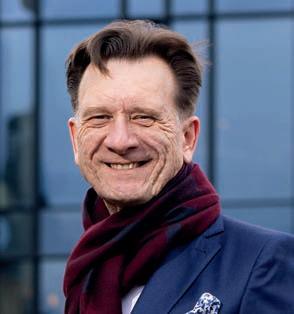
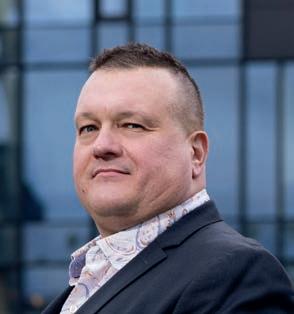
Paweł Brodzik Managing Director, Neo-Świat
Associated with fit-out industry since 1997. After completing his MBA in Australia, brought the improvement-based business model to Poland.Co-founded Neo-Świat in 2001. Regards mutual trust and transparency as key business values. At Neo-Świat responsible for strategic planning, continuous improvement and teamwork.
Interview starts on pages 16
CONTRIBUTOR
Svetlana Bagheri (Fedosova)
Svetlana founded Entralon Club in 2022. She has been working with leading real estate personas in Europe since 2016. She has established the GRI Club Chapter in CEE and delivered high-quality events for members of the Club. In 2022 Svetlana successfully led CEE Quality Awards to its comeback and now decided to focus on delivering top-content events for CEE Real Estate leaders. In the time of crisis and recession at war at the doorstep, CEE Real Estate leaders have the urge to get together and discuss what really is going on in the market. Entralon Club provides such a platform. Svetlana is a passionate advocate for gender equality, work & life balance. She coaches young female entrepreneurs in her free time and enjoys seeing people around grow and prosper. Read about ther last event on page 38

Morten Lindholm
Editor-in-Chief/Publisher mlindholm@valkea.com
Kevin Demaria
Art Director kdemaria@valkea.com
Contributors
Sergiusz Prokurat
Sean Reynaud Beata Socha
Sales Izabela Kaysiewicz ikaysiewicz@valkea.com
Agnieszka Mańkowska amankowska@valkea.com
Katarzyna Pomierna kpomierna@valkea.com
Print & Distribution
Krzysztof Wiliński dystrybucja@valkea.com
Event Director, Valkea Events Magda Gajewska mgajewska@valkea.com
Contact:
phone:
fax:
e-mail: wbj@wbj.pl
WBJ.pl
For

6 FEBRUARY - MARCH 2024 WARSAW BUSINESS JOURNAL
75 00
+48 22 257
+48 22 257 75 99
enquiries,subscriptions-related please email us at wbj@wbj.pl
@wbjpl All photographs used in this issue are courtesy of partners and companies unless specified otherwise. Copyright © 2024 by Valkea Media SA All rights reserved. This publication or any portion thereof may not be reproduced or used in any manner whatsoever without the express written permission of the publisher. Published by ul. Jerzego Ficowskiego 15 Valkea Media S.A.01-747 Warszawa Tomasz Opiela, CEO NIP: 525-21-77-350 www.valkea.com To subscribe through RUCH SA: www.prenumerata.ruch.com.pl, prenumerata@ruch.com.pl, 801 800 803
WarsawBusinessJournal

BUSINESS FAMILIES
FESTIVAL OWNERSHIP OBLIGES!
Development in business, harmony in the family!

The Business Families Festival is a selection of paid and free stationary and online meetings for business families.
Each meeting has a separate agenda, different speakers and participants. You can sign up for one or more meetings: the full selection of meetings can be found at www.FestiwalRodzinBiznesowych.pl
REVIEW
LEASING BOOSTED THE ECONOMY BY OVER PLN 100 BILLION IN 2023
As much as PLN 102.5 billion in financing for investment was provided by leasing companies last year, setting yet another record. Approximately half of this amount is accounted for by passenger cars and small vans. There is no need to wait for months for cars now that production has begun. Equipment and machinery investments by small businesses increased after the October elections.
The record PLN 102.5 billion of financing provided means an increase of 16.3 percent compared to the previous year, which is significantly higher than inflation. Leasing companies emphasize the change in the economic situation in the last quarter of last year when they provided nearly PLN 30 billion of new financing, and the y/y dynamics was 19.1 percent.

8 FEBRUARY - MARCH 2024 WARSAW BUSINESS JOURNAL
IN
SHUTTERSTOCK


DOMESTIC Poland's hard coal sector sees stable sales amid fluctuating production
According to the Industrial Development Agency (ARP), Poland's hard coal sales remained steady at 4.2 million tons in December 2023, compared to 4.18 million tons the previous month and 4.03 million tons in December 2022. However, net production dipped to 4 million tons from 4.64 million tons in November and 4.41 million tons in December 2022. Hard coal stocks decreased to 4.2 million tons from 4.33 million tons in November and rose significantly from 2.17 million tons a year earlier. Employment in the sector slightly declined to 76.1 thousand people from 76.16 thousand in November and 77.47 thousand in December 2022.
ECONOMY Shortages, production downtime and the specter of price increases in Europe and Poland
Analysts point to raising concerns about Eurozone inflation and economic growth. The Red Sea route, crucial for European trade, is under continued Houthi attacks targeting Israeli-bound ships, affecting global vessels. Longer shipping routes increase freight costs and production delays. Companies like Tesla and Volvo halt production due to supply chain disruptions.
Marek Tarczyński, president of the Polish Chamber of Forwarding and Logistics, warns of strong dependence on Asian goods, predicting supply shortages and price hikes, impacting European
and Polish inflation rates. The OECD has lowered its Eurozone growth forecast by 0.3 percentage points to 0.6% due to the situation.
ECONOMY
Poland becomes hub for international travel
Poland stands out in Central and Eastern Europe as the only country where air traffic has significantly rebounded compared to the pre-pandemic year of 2019, despite challenges faced by larger aviation markets like Germany, France, and Italy. The country's regional airports play a crucial role in this recovery, contributing to a 4.5% increase in passenger traffic compared to 2019. The use of regional airports has facilitated the growth of low-cost airlines in Poland, leading to a more diversified
and evenly distributed air traffic. Meanwhile, Germany struggles with a mature aviation market, impacting long-haul flights, while Scandinavian countries face challenges due to flight shaming and restrictions on air corridors, affecting their aviation businesses.
INTERNATIONAL EY: international political pressures on supply chains expected in 2024
Rising global tensions in 2024 mean businesses must prioritize reducing supply chain risk. Sourcing key materials and diversifying chains are crucial due to geopolitical instability, according to the latest EY-Parthenon report: “2024 Geostrategic Outlook.”
Public support for R&D in clean tech is expected to boom, offering opportunities for companies partnering with governments. Sustainable development will become an even bigger focus for businesses, driven by investor demand and lower capital costs.
This year provides a chance to re-evaluate supply chains, prioritizing resilience and minimizing risk.
INTERNATIONAL NATO Meets spending goals, Poland leads defense investment
While former US President Donald Trump's warnings of NATO protection conditions reverberate, ten European allies met the 2% GDP defense spending target in 2023. Secretary General Jens Stoltenberg anticipates 18 NATO countries meeting the threshold this year, despite concerns. Excluding the US, NATO's collective defense expenditure has surged, driven by geopolitical tensions. Notably, Poland leads with nearly 4% of GDP allocated for military purposes. Plans include doubling troop size and tank acquisitions, showcasing a robust modernization drive, as affirmed by Deputy Prime Minister
10 FEBRUARY - MARCH 2024 WARSAW BUSINESS JOURNAL News
IN REVIEW THIS PAGE SPREAD SHUTTERSTOCK (3)
STRONG YEAR AHEAD

26.7% more passenger cars produced y/y in 2023 (KPMG and PZPM)
4.1% y/y in 2023
Increase in turnover for retail and service networks operating in shopping centers (Retail Institute)
25% y\y revenue growth for PwC Polska to a record high of $53.1 billion, up by 5.6% (PwC)
0.6%
Sales inch up y/y in December (Eurostat)
8% warehouse vacancy rate (JLL)
1,927
Largest network of fuel stations–Orlen (Polish Organization of Petroleum Industry and Trade - POPiHN)

80% Number of Poles that choose OOH delivery points
(DPD Poland and European Geopost's "e-Shopper Barometer 2023")
Difficulties
21% of Poles lack any savings ("Savings Barometer 2023" study)
Core economic figures
25k
Number of energy consumers that changed providers in 2023 (Energy Regulatory Office (URE))
50% average natural gas price drop in 2023 (URE)
22.2% increase in shoplifting misdemeanors in Poland (Polish Police Headquarters)
PLN 2.77 bln
Investment by Tauron in power grids in 2023 (ISBnews)
WBJ.PL 11 News in Numbers IN REVIEW
>>>
Władysław Kosiniak-Kamysz. Investment in domestic arms manufacturing underscores Poland's commitment to bolstering defense capabilities.
INVESTING
Poland on the radar for an investment of €53 billion
Innovation and technology, sustainability, and social responsibility have long invaded our daily lives. However, the project of the company MMgo Investment Group Scr. takes a step toward the future by investing in technological development, innovation, and Artificial Intelligence in the textile and footwear sectors.
Poland, Portugal, France, Spain, Italy, and the United Kingdom are the countries on the radar of this ambitious investment, which aims to produce luxury brands, benefiting companies in the textile and footwear sector that have quality production potential. In recent years, companies in the textile and footwear industry have been going through a serious economic crisis, given their positioning in medium-low segments.
It is undeniable that with a total investment of €53 billion (of which €30 billion will be for infrastructure that boosts business tourism through hotels, services, logistics, and real estate) this project would allow the Polish industry to reposition itself in the international market, by boosting high-quality production and supporting exports for luxury fashion brands.
Moreover, this project, to be established in Poland, will be the largest private investment ever brought to the country, and will represent 6 percent of the national GDP.
BUSINESS
More than half of Polish CEOs see need for transformation to remain profitable long-term
The 27th global CEO Survey by PwC reveals that 55% of Polish CEOs
(compared to 45% globally) doubt their current business trajectory will ensure profitability over the next decade, signaling necessary transformations. Despite increased optimism regarding global economic growth compared to the previous year, many CEOs express concerns about long-term profitability. Technology emerges as the primary factor driving long-term value creation.
While global CEOs focus on technological advancements, Polish CEOs emphasize the impact of governmental regulations and shifting customer preferences. Additionally, CEOs recognize their role in responsible AI utiliza-
tion, foreseeing significant changes in their companies' operations. Concerns include workforce upskilling, cybersecurity risks, misinformation, legal liability, reputation risks, and biases.
The survey sampled 4,702 CEOs globally, including 31 in Poland and 111 in Central and Eastern Europe, with data weighted proportionally to ensure representativeness.
BUSINESS
Court overturns 2021 decision against Eurocash by UOKIK for PLN 76 million
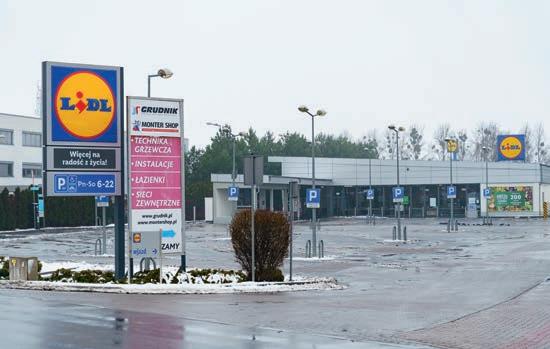
DOMESTIC Poles divided on lifting Sunday trade ban
Poles are deeply divided on Sunday trading, with nearly equal support and opposition. 46% of Poles support resuming trade on Sundays, while 44% are opposed. Only 10% have not made up their minds. Support for the lift on trading ban has dropped slightly, especially among those with lower income or in smaller towns. Young, urban, educated Poles with higher income opt for stores remaining open on all Sundays.The government hasn't acted despite promises, potentially due to declining support. Opponents cite worker rights and different shopping habits in smaller locations. While a majority still wants some change, falling support might make the government wait until other issues are addressed.
12 FEBRUARY - MARCH 2024 WARSAW BUSINESS JOURNAL
IN REVIEW News SHUTTERSTOCK
The Court of Competition and Consumer Protection (SOKiK) overturned entirely the decision of the Office of Competition and Consumer Protection (UOKiK) from November 30, 2021, which imposed a fine of PLN 76.02 million on Eurocash for allegedly using unfair trading practices. Eurocash welcomed the decision, stating it aligns with the company's position. The verdict is not final, and Eurocash did not create reserves due to the UOKiK's decision. In 2021, UOKiK found that Eurocash imposed unjustified fees on suppliers of agricultural and food products to reduce their compensation.
BUSINESS
Only 20% of Polish enterprises are ready for National e-Invoice System (KSeF)
Only 20% of Polish businesses are prepared to implement the National eInvoice System (KSeF), with 32% having taken no action regarding the impending reform due to technological barriers and high costs. Larger companies, employing over 250 workers, show the most readiness, with 49% already taking steps toward KSeF implementation. In contrast, micro-enterprises, with
up to 9 employees, exhibit the least readiness, with nearly half having taken no action. Challenges include adapting procedures and tools for invoicing, conducting employee training, and additional costs. Uncertainty regarding process adaptation is justified, affecting all organizations, whether they have implemented e-invoicing tools or not. Flexible tools enabling process adjustments without extra costs are crucial for compliance.
FINANCE
Ministry of Finance: PLN 126.7 Billion to be transferred to domestic market
The Ministry of Finance disclosed that as of January 31, 2024, PLN 126.7 billion will be transferred from the budget to the domestic market by year-end. February 2024 will witness no fund flows from Treasury securities redemption or interest payments. The outstanding debt in 2024 amounts to PLN 135.7 billion, covering wholesale bonds, retail bonds, and foreign market bonds/loans. By January's end, budget accounts held PLN 138.6 billion, ensuring liquidity for borrowing. Bond sales in January
Quote of the month
2024 totaled PLN 33 billion, marking an increase from the previous year. The consolidation of liquidity management amassed PLN 93.3 billion by January's close, with domestic market debt reaching PLN 862.3 billion by December 2023. The average maturity of domestic debt stands at 4.12 years.
BUSINESS
QNA Technology Completes pilot production line for quantum dots materials
QNA Technology completed the construction process of the first experimental version of the Quantum Dot Synthesis Pilot Line, as announced by the company. The next steps include testing the entire system technologically, reproducing the synthesis process on the pilot line, and adjusting it to meet the technical conditions specific to the pilot line. The company aims to strengthen its industry reputation by meeting customer demands for quantum dot materials. Future plans involve optimizing processes, increasing synthesis efficiency, automation, and reducing production costs.
“This new branch of the economy is a huge opportunity for Polish companies involved in the production and supply chain for onshore and offshore wind. Domestic entrepreneurs have the potential to offer the main construction elements, i.e. wind towers, turbine elements, marine transformer stations. However, urgent support and decisive investment actions are needed. A conscious industrial strategy of the state is necessary, which will give priorities in the development of factories, projects, industry education and obtaining financing. ”
Piotr Czopek, director of regulation at PWEA
WBJ.PL 13 IN REVIEW Quote News
ELECTIONS IN POLAND SPARK CHANGES IN POLITICAL SCENE
As the local elections approach, Poland’s economic landscape stands at a critical juncture. The nation’s economic narrative was about to change, after the 2023 elections, however it does not look that simple. With the 2024 local elections nearing, Poland's economy teeters between recovery and uncertainty. Will prudent policies sustain a soft landing?
BY SERGIUSZ PROKURAT
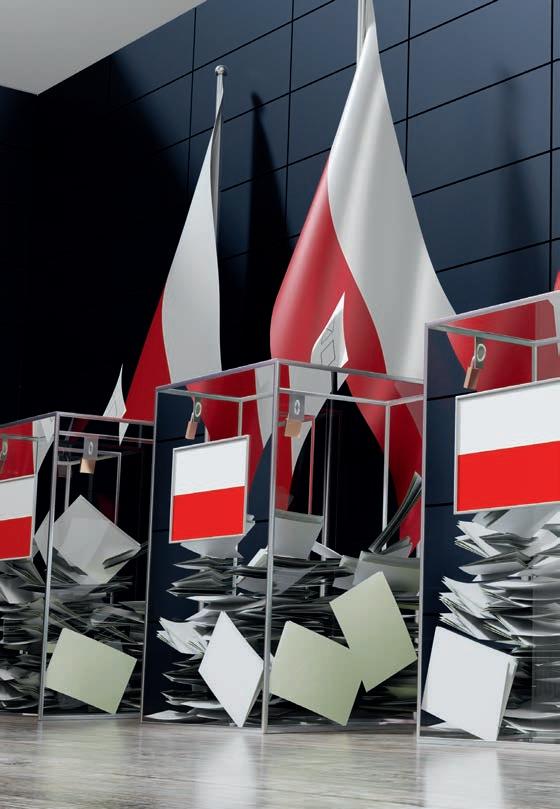
the Polish proverb “Od Sasa do Lasa” is used to convey that two or more people, or views, differ significantly from each other and are contradictory. In other words, it highlights situations where a wide range of opposing views or contradictions coexist side-by-side. The saying has its roots in the 17th century political conflict between the followers of the Wettin (Saxon) dynasty (“Sas”) and the supporters of king Stanisław Leszczyński (“Las”). Interestingly, the original meaning of this saying likely comes from a pair of horses pulling a cart— one running slowly to the left (“sasa”) and the other heading toward the forest (“las”), signifying two completely different directions. It’s a nice exemplification of today’s Poland. After nearly a decade in power Poland’s dominant party, Law and Justice Party (PiS), was ousted in the 2023 parliamentary elections. A new multi-party coalition government, led by Prime Minister Donald Tusk, vows to do things differently. The new government aims to shift towards a more EU-friendly direction, reform judicial independence, and uphold the rule of law. However, challenges include overcoming PiS's institutional influence, restructuring state-owned companies, and demonstrating progress to the electorate.
SOCIAL VS LIBERAL
Poland is visibly divided into two philosophies that reflects the attitude of Poles. On one side is Social
14 FEBRUARY - MARCH 2024 WARSAW BUSINESS JOURNAL
SHUTTERSTOCK OPINION
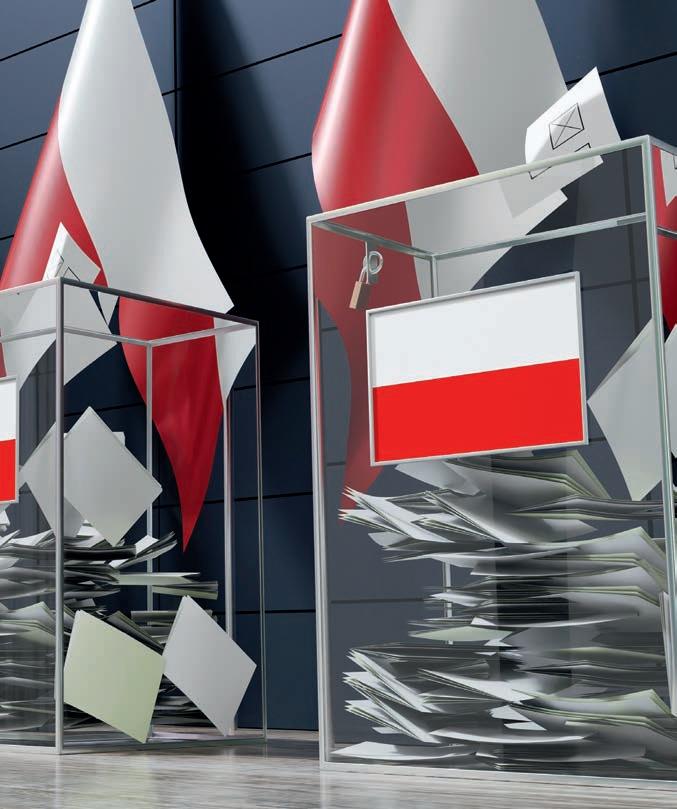
Poland, at times leaning towards socialism, which prioritizes social cohesion, welfare programs, and communal support. They are less amicable towards the EU and the global community. On the other hand, Liberal Poland champions individual freedoms, free-market principles, and minimal government interference. Liberals advocate for entrepreneurship and economic vitality. These contrasting visions offer divergent paths for Poland, impacting its economic, social, and political landscape. While the liberals emerged victorious in the last election, their mandate remains fragile, contingent on forthcoming outcomes. The ongoing debate profoundly influences the country's future trajectory, particularly with another election on the horizon.
ELECTIONS COMING
The 2024 local government elections, are scheduled to take place in April. These elections were initially planned for the autumn of 2023, following the five-year term of local government bodies. However, to avoid overlapping with parliamentary elections held in October 2023, the Polish authorities changed the schedule. Voters will select mayors, city councillors, district councillors, and representatives for municipal, county, and regional councils. At the local level, candidates and parties are wrestling with strategies to tackle regional economic challenges, promote industrial growth, attract foreign investment, and effectively oversee infrastructure development, all amid the challenges of early 2024. “Third-Way,” Civic Coalition and “Left” were the three separate electoral committees that came together to form a government in 2023 and secure a parliamentary majority. Now they have split and will fight for voters. If PiS
experiences a loss, as indicated by polls, it could potentially face significant challenges and internal turmoil within the party.
In 2023, the Polish economy displayed resilience, although GDP growth reached a modest 0.2%, slightly under initial forecasts. While the 2024 outlook appears more optimistic after the shortterm inflation surge of 2023 abates, projections anticipate inflation rates of 4-6% in 2024 and a milder 3-4% in 2025. Despite this, Poles continue to receive state subsidies on electricity and gas. Removing price freezes and zero VAT on food could prove unpopular. Even cautious politicians, including those of liberal leanings, would approach such measures delicately.
IT'S NEITHER GOOD NOR BAD
Indeed, Poland faces numerous challenges. As of 2021, the public finance deficit in Poland stood at a mere 1.9% of GDP. However, by the end of 2023, it surged to as high as 5.6% of GDP. Consequently, this spring, Brussels will initiate the excessive deficit procedure against Poland. Additionally, the government has planned for a significant deficit for 2024, amounting to 5.1% of GDP. Another challenge arises from the necessity to borrow record-high amounts from financial markets, potentially leading to a depreciation of Polish debt or even a fiscal crisis. It’s worth noting that Poland currently has one of the highest deficits in the EU, and financial transparency has worsened since the outbreak of war. Several new off-budget funds have emerged, where the government allocates its expenses, eluding parliamentary control.
The underperformance of the German economy, potentially leading to a crisis in Europe, combined with a strong Polish zloty (PLN) and increased price competition from Asian manufacturers, may impact Poland’s foreign trade balance. A huge river of funds, committed by the European Commission as a post-pandemic aid package, is expected to boost investment in Poland. However, it will also strengthen the Polish zloty (PLN) even more. In the meantime, Poland relies heavily on coal for energy, which poses both environmental and economic challenges. The nation requires a transition towards more sustainable energy sources. Investments in modern energy infrastructure, including nuclear or renewable energy, alongside enhancing energy efficiency, are crucial for ensuring stability and security in energy supply. The current government remains undecided on whether to continue significant investments, such as the construction of a new airport in Baranów and the state-owned development of Izera’s EV factory in Jaworzno. Moreover, the ongoing conflict on the eastern border exacerbates concerns regarding stability. “Od Sasa do Lasa” encapsulates the ongoing power struggles, wars and the twists of fate in Polish history.
WBJ.PL 15
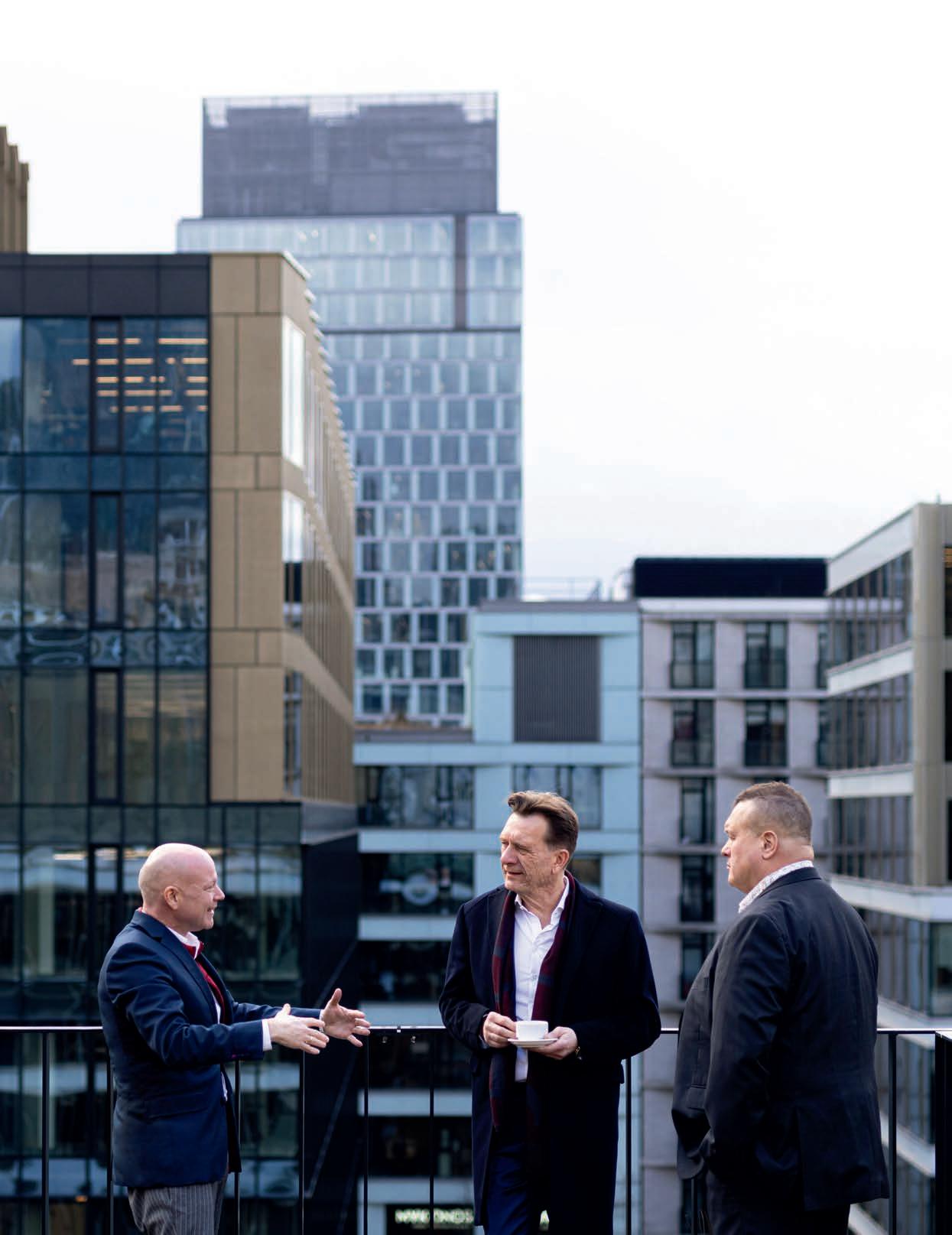

FIT TO BE!
Morten Lindholm, Editor-in-Chief, met with Neo Świat founders Rajmund & Paweł in downtown Warsaw, 15 months after they unveiled Neo Świat. Their discussion delved into topics such as values, the Polish real estate market, entrepreneurship, the importance of quality, and prospects for the future.
WBJ.PL 17
“The significance of relationships, both internal and external, cannot be overstated when facing the challenges of company growth. I want to emphasize the recruitment of talented individuals in a competitive market, which has been facilitated by maintaining a personal connection and open dialogue with team members. Our success stems from a people-centric approaches.

WBJ: Good to see you again Paweł & Rajmund. Let me kick off our talks by asking how you are doing and how has business been the past year?
What a year it has been. A transformative year. Initially focused on regaining momentum, we diligently reached out to our market contacts, updating them on the new circumstances. As spring turned into summer in 2023, we began to observe a notable change in momentum and purpose, sensing a positive evolution in our business endeavors.
A key for success was cultivating a familial atmosphere within our tight-knit team. Plus, Rajmund and the business development team deserve immense recognition for their contributions, diligently securing projects and expanding our network.
Of course, we didn't expect any handouts. It's been hard work, but work we take pride in. We never turn down an opportunity to submit an offer for a client. Over the past year, we've likely sent out 2-3 offers a day. We do this with a clear purpose, believing that our efforts have ramifications for both the recipient and, ultimately, bring benefits and respect to us.
Recognizing the growth from 35-40 employees a year ago to 100 is a significant achievement. It's based on business growth, connected with relations both with clients but also internally. With our values, we've been able to attract the best fitters in the market, including those who have returned to work for us due to the family culture. Our team comprises architects, project managers, cost control personnel, business development managers, and the individuals responsible for the actual fit-outs who are
100 strong, on top of the previously mentioned number.
We now have 8 project teams operating across Poland, with teams in Tri-city, Wroclaw, Krakow, and of course Warsaw. This expansion signifies our increased scale, providing us with more stability and flexibility to approach each project optimally for our partners on a local level.
What would you highlight as key lessons learned during the past year?
The significance of relationships, both internal and external, cannot be overstated when facing the challenges of company growth. I want to emphasize the recruitment of talented individuals in a competitive market, which has been facilitated by maintaining a personal connection and open dialogue with team members. Our success stems from a people-centric approaches.
We came from corporate structures, which has equipped us with valuable skills. That experience provided us with improved tools for processes such as contract pricing, procurement, project management, and goalsetting. We've been able to leverage this expe-
18 FEBRUARY - MARCH 2024 WARSAW BUSINESS JOURNAL
EXCLUSIVE

ABOUT NEO SWIAT
Neo Swiat's core business focused on the fit-out of commercial, residential, and office spaces, encompassing design, arrangement, cabling, and infrastructure management. With their dedicated team of experienced specialists, they ensured the reliable implementation of projects down to the smallest detail, offering a guarantee of quality throughout.
rience in our new operations, making it easier for partners to understand our objectives.
I would like to express our heartfelt gratitude to our open-minded customers for the opportunities and trust they have bestowed upon us. Through ongoing conversations with our partners, we aim to provide assistance and offer solutions, enabling them to plan ahead effectively. Our accomplishment of completing over 60,000 square meters of fit-outs in 2023 is significant, and it underscores the importance of strong relationships in our endeavors.
How have you navigated the difficult real estate market?
Obviously the office market bottomed out. All the data corroborates this, showing low investment levels and a lack of new projects.
I think we should acknowledge that things will never return to how they were. Our society has been altered, first by COVID and now by the devastating war east of the border. These events have changed behaviors and habits, affecting various patterns in the urban landscape, such as where and how people live, commute to the office, and seek entertain-
ment and services in office districts. Additionally, generational differences play a role, with younger individuals adopting a more balanced approach to work and life. All of these factors deeply influence the future of real estate.
For us, it signifies that we've expanded our services beyond the office market. Our expertise now spans multiple sectors: residential properties continue to thrive in Poland, Private Rental Sector (PRS) has seen recent success, logistics remains strong, and there's a significant demand in the high-end residential segment where virtually anything we build is sold. Let's not overlook hospitality either. This year, we're concluding several massive hotel projects, delivering hundreds of rooms.
We've expanded our offerings to include what we term 'Design & Build', where we not only provide excellent design but also ensure proper functionality and efficient execution, all within the specified time and budget. This may also involve fulfilling individual orders for furniture or decorating the designated space. When executed correctly, this approach is the most effective way for investors to save both time and money. It eliminates the friction between partners during various stages of the project.
The conversation transitions to the “design and build” concept in real estate. The expert underscores the advantages of integrating design and construction phases, stressing the importance of trust and transparent communication between clients and contractors. They outline the hurdles present in the Polish market and draw comparisons to practices in Western Europe.
Which sectors will be most important for you in the coming year?
As previously discussed, we observe macro trends impacting the real estate market, including a potential shift from homeownership to renting in Poland. The PRS market is nascent in Poland but holds significant potential, with projections of up to a million units for such projects. These ventures are particularly compelling for us as fit-out specialists because the standardized nature of these projects allows for efficient and streamlined processes, making it convenient to work on multiple apartments within the same scheme.
The same goes for the hospitality sector, it presents significant opportunities. As mentioned, we are currently involved in several major projects, with more details to be shared upon completion. The market potential in the region is substantial, prompting us to consider business expansion in the Central and Eastern European (CEE) region. Many hotel owners and operators operate across borders, presenting opportunities for us to extend our services. For instance, hotel markets in Budapest, Prague, and Vienna boast around 40,000 rooms per city, significantly larger than Poland's. Additionally, listening to our clients reveals their primary concern: a shortage of skilled contractors in the fitting area. Coupled with the increasing interest in travel, this sector remains a focal point for us, and we maintain close relationships to stay informed.
ESG is a new market. What are your observations about ESG and its impact?
There is no doubt that ESG will influence the real estate market. While our company may be relatively small in scale, we gauge our ESG success by our ability to assist clients in reducing carbon footprints and conserving energy.
We already have projects underway in Wroclaw where we are
WBJ.PL 19
Essentially, at the end of the day, we're moving towards processes like standardization, prefabrication, pre-manufacturing, and robotics—anything that reduces the reliance on human labor in the construction process.
revitalizing buildings, altering their functions. While we don't alter the building's structure extensively, through redesigning and incorporating technology, we inadvertently promote ESG principles. By introducing technological advancements to the building, we inherently contribute to creating an outcome that better serves the environment and the society overall.
Other areas ripe for both business development and ESG impact are within the industrial sector. Many old factories, warehouses, and production facilities were built at a time when technology, social impact, and workplace conditions were different concerns, and energy efficiency wasn't a priority. However, times are changing, and there is significant potential for development in these areas. A fit-out company can play a crucial role in optimizing costs and effects for these locations and companies, considering the evolving landscape of technology and environmental responsibility.
So we now possess the expertise , and have employees that can support the clients in making the appropriate decisions, in terms of implementing ESG.
How are you preparing to meet the anticipated rise in market demand and competition as conditions improve?
We are in a good spot. However, there are indeed challenges facing the construction and real estate development sectors in Poland. Despite the current slowdown, issues such as the scarcity of skilled labor, aging demographics, and the imperative for innovation are already apparent.
This is a significant discussion, and let's approach it systematically. Remember when Poland joined the EU, and over two million Poles migrated to the UK and Germany for employment? Now, Poland finds itself in a similar predicament, needing more labor. This presents a challenge for the government and requires legislative attention. I believe we require around half a million workers in Poland, and it's crucial to address this before it's too late and demand exceeds supply. Otherwise, we risk construction costs escalating significantly.
We still have skilled labor, and they can continue to educate the younger generations. However, my concern lies in the fact that these youngsters may not necessarily come from Poland, as their focus seems to be on higher education and technology.
Essentially, at the end of the day, we're moving towards processes like standardization, prefabrication, pre-manufacturing, and robotics—anything that reduces the reliance on human labor in the construction process.
It's crucial for us to voice our concerns and acknowledge our responsibility to the market. We want to emphasize that in the construction industry, skilled workers are essential; financial plans alone won't suffice. The time to act and implement proactive measures to tackle challenges and capitalize on opportunities is now.
KEY TAKEAWAYS
1. Our business underwent a revolutionary shift with the power of relationships. Leaving a corporate giant and venturing on our own was daunting, but the market's response exceeded our expectations, thanks to the support from contacts and friends spanning over two decades.
2. The transformation in 2023 was achieved by assembling a stellar team of professionals committed to delivering high-quality work. Rooted in fundamental values of care, trust, and purposeful action, it's not rocket science but a recipe for success.
3. With 23 years in the business, transitioning from entrepreneurs to a corporate setting and back, our goal extends beyond acquiring more jobs. We aim to elevate standards, utilize our experience to support employee development, offer clients faster and cost-effective solutions, and share market insights for sustainable development.
4. Fitting over 2 million sqm of real estate space taught us valuable lessons. A one-size-fits-all approach doesn't work; acting local and respecting individual differences is crucial.
5. While the market might not fully grasp it now, in five years, the cost of finishing offices, apartments, or hotels could surpass Western Europe due to high demand and a shortage of skilled resources.
20 FEBRUARY - MARCH 2024 WARSAW BUSINESS JOURNAL
“
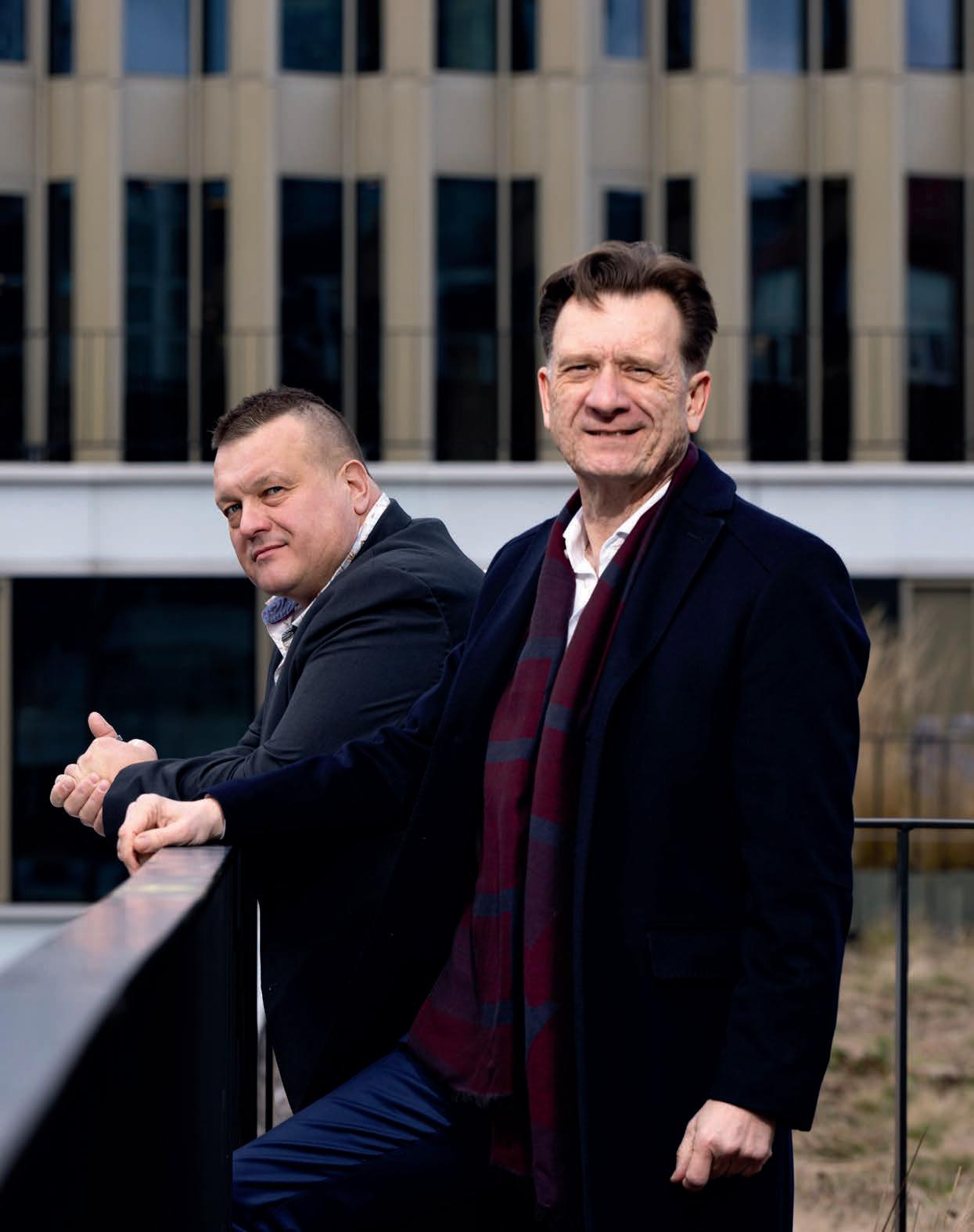
WBJ.PL 21
Get a Polish business news briefing in English delivered to your inbox each weekday before 9:00

Scan code & Sign up now for a no-obligation 2-week trial.

POLAND EUROPE’S FUTURE
POLAND HAS SHOWN REMARKABLE RESILIENCE AMIDST HEADWINDS AND MULTIPLE CHALLENGES. WE HIGHLIGHT THE AREAS THAT SHOW THE BIGGEST POTENTIAL AND ATTRACT THE MOST INTEREST: TECHNOLOGIES, GREEN ENERGY AS WELL AS POLAND'S DRIVEN AND SKILLED WORKFORCE.
WBJ.PL 23
Investing in Poland | Technology & Innovation | ESG & Energy | Real Estate/gastronomy | Workplace
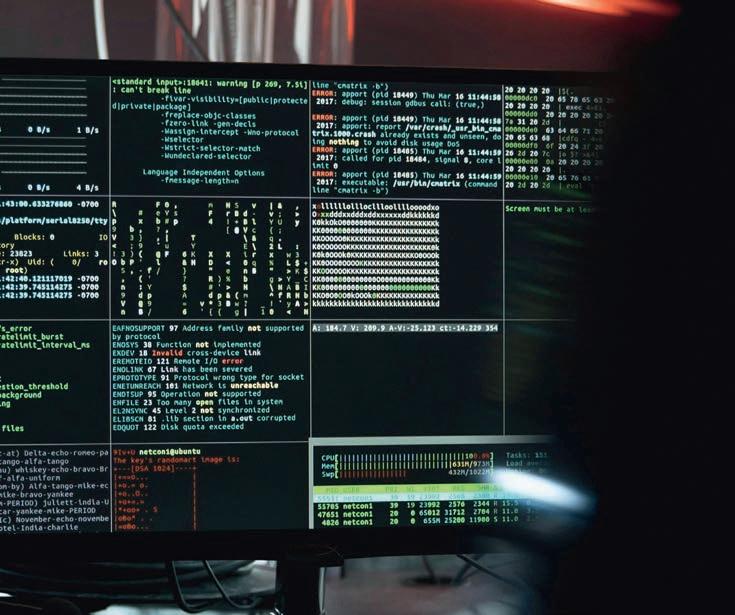
5.1 TRILLION USD IN IT EXPENDITURES
The development of new technologies remains a driving force behind global economic investments for yet another year. Forecasted by Gartner, global IT spending in 2024 is expected to reach 5.1 trillion USD, marking an 8% increase from the previous year. Enterprises predominantly invest in automating and streamlining business processes, cloud solutions, and cybersecurity.
The development of new technologies remains a driving force behind global economic investments for yet another year. Forecasted by Gartner, global IT spending in 2024 is expected to reach 5.1 trillion USD, marking an 8% increase from the previous year. Enterprises predominantly invest in automating and streamlining business processes, cloud solutions, and cybersecurity.
Polish business representatives acknowledge the necessity of investing in new technologies. As per the recent KPMG report titled "Modern CFO in a Transforming Company: New Strategies and Challenges," 35% of surveyed companies intend to boost IT expenditure by more than 10%, while
an additional 10% aim for incremental increases. Only one in every five firms plans to curtail such investments in 2024.
"This highlights how crucial IT departments have become. They have long ceased to be mere providers and operators of software and hardware. Modern IT actively contributes to business operations; it's a partner. It has transitioned from being a cost center to a revenue-generating service provider," emphasizes Piotr Szypułka, Director of IT Infrastructure Maintenance at Polcom.
Automation as a Priority
According to the Polcom and Intel study, 88% view new tech as beneficial, with 71% targeting automation for innovation. Cloud
computing aids cost-effective operations and predictive planning. Advanced algorithms allow precise production forecasting and optimization, aided by beacon data for machinery maintenance planning.
Digital Transformation in Financial Management
Digital transformation is also revolutionizing enterprise financial management. According to KPMG's research, 76% of companies find the financial planning process too time-consuming. Only 16% of CFOs claim this process has been automated, while 43% of enterprises are currently working on improving planning efficiency. 55% of respondents in the Polcom and Intel survey plan to migrate critical applications and systems to the cloud.
Priority on Cybersecurity
Analysts anticipate significant growth in cybersecurity investments. "One of the reasons is the new EU directives such as NIS2, DORA, and CER. They impose precise requirements regarding security levels, incident reporting, and introduce severe penalties for non-compliance," explains Stanisław Borkowski, Director of Security and Quality at Polcom.
Research firm Cybersecurity Ventures estimates cybercriminal activity losses at 8 trillion USD in 2023 and a staggering 410 trillion USD by 2025. This substantial increase is partly attributed to the proliferation of cybercrime-as-a-service and the utilization of artificial intelligence for cyberattacks.
"It's not an exaggeration to say that there's an arms race between organizations and cybercriminals. Each side continuously tries to outsmart the other. Conventional intelligent antivirus software or regular backup creation are no longer sufficient," emphasized Piotr Szypułka.
External partners are crucial for cybersecurity; yet not all companies can afford inhouse teams.
24 FEBRUARY - MARCH 2024 WARSAW BUSINESS JOURNAL
Technology & Innovation | Poland. Europe’s Future
POWERING POLAND'S GREEN SHIFT
As Poland strives towards a zero-emission future, the spotlight intensifies on
indispensable
the
role of energy storage in stabilizing renewable energy sources. Despite early-stage development, Poland's strides in this sector hold promise for grid resilience, consumer security, and reduced reliance on external factors.
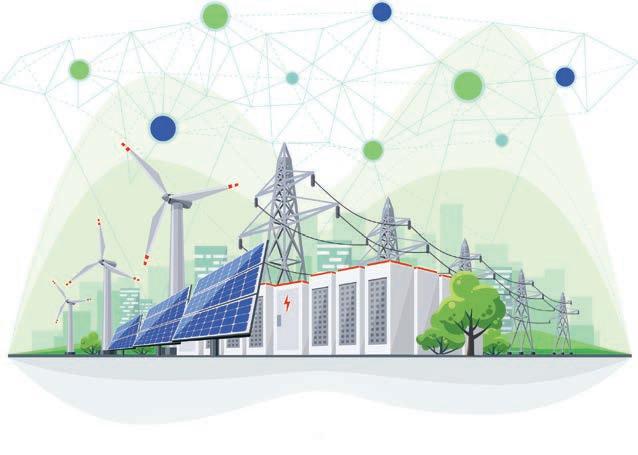
Without energy storage, energy transformation will not be possible
The importance of energy storage as a fundamental component for a successful green transformation has been widely acknowledged. It plays a vital role in stabilizing the energy system sourced from wind and photovoltaic farms. The development of this sector is essential for achieving a zero-emission future, ensuring consumer security, and reducing dependence on external factors such as imported fuels, inflation, and armed conflicts. Although Poland's progress in storage development is at an early stage, its potential impact is significant.
Renewable energy sources require storage
The previous year marked notable advancements in renewable energy, with a remarkable 23.7% of Poland's electricity stemming from renewable sources in 2023. Yet, the growing enthusiasm for renewables, coupled with favorable weather conditions, frequently results in surplus electricity generation. This strains the power grid and leads to rejections of renewable installations' grid connections. Enhancing the grid's flexibility is crucial for improvement. Electric energy storage helps stabilize the situation by
absorbing surplus energy during peak production and releasing it when required.
Multiple solutions
The Ministry of Climate and Environment has undertaken various actions to support energy storage technology development, including educational and financial support for investments. We are currently awaiting the government's decision on launching the My Electricity 6.0 program, the new edition of which was announced the day after the new Council of Ministers was sworn in.
Micro-prosumer setups also have the potential to significantly expedite energy transformation. As the quantity of renewable sources linked to the local distribution grid grows, it presents a challenge to its optimal operation. Frequently, voltage levels surpass acceptable thresholds, leading to a failure to reap the benefits of the generated energy.
By observing the constant increase in power from renewable energy sources, it becomes clear that devising novel techniques to stabilize power grid operations is imperative. Supporting renewable sources with energy storage enables stable and predictable energy management in the power system.
Euros Energy is a Polish heat pump engineering firm.
Aneta Gałka, PR Director, US Energy
WBJ.PL 25 ESG & Energy | Poland. Europe’s Future

COMING SOON TO A CITY NEAR YOU
On a dark, windy, and somewhat rainy Saturday afternoon, we met Karol Szafraniec and Bartek Serdakowski-Goldstein at their newly opened Popolare restaurant in the Wola district of Warsaw and talked about seeking explosive growth across Poland. .
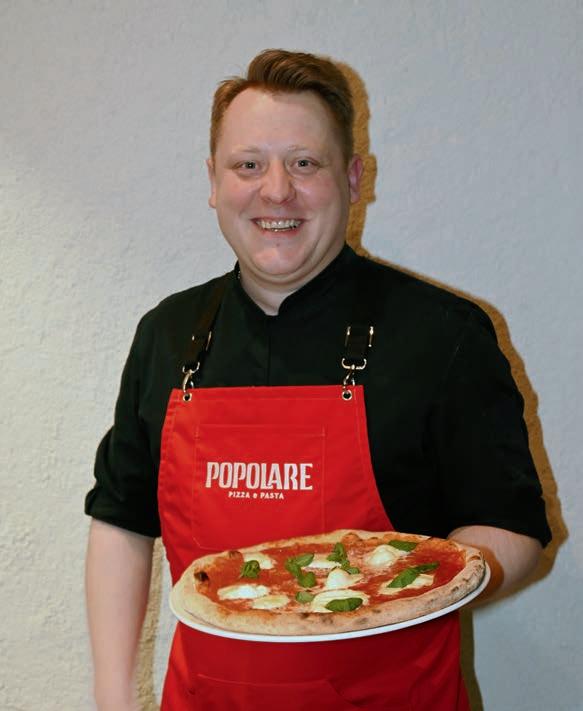
Inspire: "With the headwinds of higherconstruction costs and increasing labor, rent, and utility costs, and the never-ending challenge of finding competent staff, why in the heck would you embark on such an aggressive growth strategy at this time?"
Karol: We believe that if we are not growing, we are dying. It’s that easy. We believe that with growth, our teams will be better, and our costs will be lower.
Bartek: We are growing to improve our margins. We have secured a lease for 500m2 in the Fuzja project developed by Echo in Lodz. We plan to open an Italian restaurant under the name Sartoria this summer. We have also secured a lease for a 400m2 restaurant in Globalworth’s Renoma project in Wroclaw. We will open another Italian restaurant here, under the name Zucca. Having Dinette next door and knowing that Globalworth’s Pawel Konarski is supporting the project from an F&B standpoint gave us comfort to sign this
lease. Our restaurant will open in the summer of 2024, meaning that we will be quite busy this year.
Inspire: We heard rumors that you guys are much more hungry than that. Can you share with us your other plans across Poland?
Karol: We also have an LOI signed for a 400m2 space in Katowice on a site that would open in 2025, but we can’t yet reveal more details than that. We are aggressively looking for sites in Gdansk, and we would entertain potential sites in Poznan, but we hear about how tough the Poznan market is for restaurants. But we really like the Stara Rzeznia developed by Vastint and hope to find space in it for one of our restaurants.
Inspire: Based on our research, approximately 7 out of 10 new restaurants these days are in the Italian cuisine segment. Yes, Poles love Italian, but this is an extremely competitive cuisine seg-
26 FEBRUARY - MARCH 2024 WARSAW BUSINESS JOURNAL
Estate/gastronomy | Poland. Europe’s Future
Real
Michał Kaczmarczyk, Head Chef, Poplare
Michał Szulc, Pizzaiolo, Popolare
Inspire, a Warsaw-based consulting company helmed by John Gabrovic, an American expat with extensive experience in F&B and Leisure, is collaborating with WBJ to provide a series of insightful interviews on the state of the gastronomy, leisure, and real estate sectors in Poland.

ment. Why did you pick Italian cuisine for growth?
Karol: We make what we love and serve it with love. We personally want to change how Italian restaurants are perceived. We pay great attention to details, aiming to showcase interior designs that echo the essence of post-war Italian venues. Gone are the days of restaurants resembling trattorias and playing Italo disco. Expect beautiful design and contemporary Italian groove or funk music.
Inspire: Why open Popolare, an Italian restaurant only 350 meters away from your successful Bocca Italian restaurant in Fabryka Norblin? Didn’t you fear cannibalization?
Karol: Why don’t you turn around and look
“I think financial success in our industry is based on one single ingredient: if you offer authentic cuisine with a focus on your guests’ dining experience, the numbers will take care of themselves.

Inspire: Let’s talk about your real estate strategy. Do you prefer mixed-use or high street locations? What criteria do you use to pick your future locations?
- Karol Szafraniec
at our restaurant? When we started our conversation, there were only two tables occupied. Now the restaurant is full with a line out the door. Sorry for not being focused on your questions, but I see that we may be short one server because we did not anticipate such strong business so quickly after opening.
Bartek: Why Popolare? Well, it kind of just happened. We had a great chef to work with, we found this location that was available at good terms, and we thought, “Why not!?” The target consumer in Popolare is different than in Bocca. Fabryka Norblina attracts a great crowd – mainly business people and wealthy Poles and ex-pats. Our average checkin Noblin is high, and we sell a lot of alcohol. Popolare is more like the neighborhood Italian restaurant – a bit smaller, less alcohol –people come here primarily for the food.
Bartek: That’s a good question. We have been in the market long enough to also have made a mistake or two – believing landlords who overpromised and under-delivered. We learned that we need to be very careful with where we sign leases. It’s all about the quality of the project, the reputation of the landlord, and rental terms. For us, the project is paramount. If we are to engage in it, it must be exceptional. People crave authenticity and uniqueness. Just look at Norblin and its success.
Inspire: What do you guys see as the bigger trends facing the restaurant industry in Poland?
Bartek: Generally, we see rents falling for restaurants and terms are getting better because we restaurateurs are finally getting credit for what we bring to retail and mixed-use projects, and it is about time. We bring the community to real estate projects.
Karol: Our generation treated dining out as truly a luxury, maybe dining out one or two times a month. Today’s young people view dining out or hanging out in a café as part of everyday life. People today truly want a real, authentic, and community-based dining experience not a food court. We think we offer that.
WBJ.PL 27
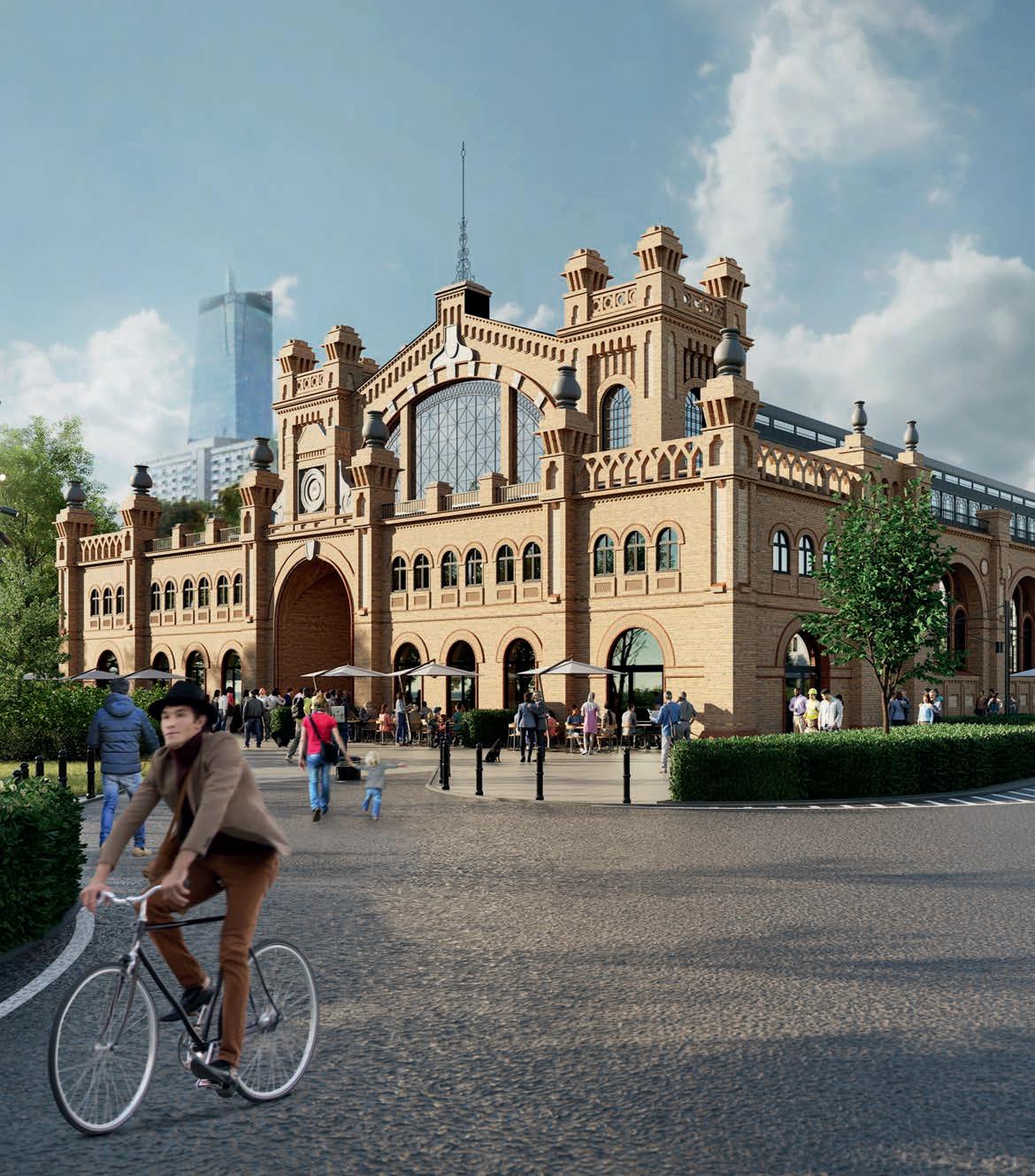
PUBLIC-PRIVATE PARTNERSHIPS: POWERING MODERN WARSAW'S GROWTH
28 FEBRUARY - MARCH 2024 WARSAW BUSINESS JOURNAL Investing in Poland | Poland. Europe’s Future


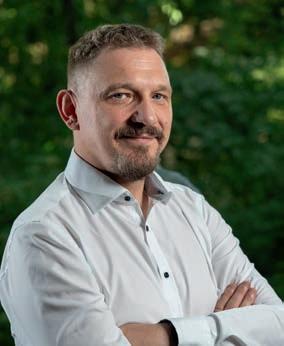
Grzegorz Kaczorowski
Director of the Economic Development Department at the City of Warsaw
Grzegorz Kaczorowski is a seasoned professional in economic development and project management. With a law degree from the University of Gdańsk, he has been deeply involved in Public-Private Partnership (PPP) initiatives since 2009. Specializing in coordinating and executing PPP and Concession-based investments, particularly in multifunctional urban development, Kaczorowski is a prolific author with publications in specialized press focusing on PPP challenges. He brings extensive managerial expertise and serves as a seasoned trainer in project management and business law, notably within the realm of large-scale investment projects.
Public-private partnerships are proving to be an excellent tool here, enabling projects that both enrich the city and provide quality living space for its residents “
The WBJ sits down with Director Grzegorz Kaczorowski to delve into the dynamic landscape of public-private partnerships (PPPs), driving infrastructure development and community enrichment in Poland's vibrant capital city.
What is a public-private partnership?
A public-private partnership (PPP) is one of the ways of addressing public needs through cross-sector collaboration. It is part of the public procurement system, where projects are carried out jointly by private and public sector entities on a contractual basis. These partnerships set forth task allocation and risk sharing between the involved parties. Unlike traditional public procurement, public-private partnerships allow for a more comprehensive and long-term implementation of selected projects.
What encourages investors to participate in PPP projects and what criteria are taken into account when selecting a partner?
Primarily, the allure lies in implementing projects that are commercially beneficial and ensure long-term profitability. The key benefit often revolves around the public component, along with the gradual distribution of profits over time. This aligns with companies seeking stable and enduring investment opportunities. However, participation in PPPs requires partners to have experience, financial capacity and the ability to deliver complex projects, which may constitute an initial barrier. In the process of selecting a partner, public institutions will often require experience and set reasonable criteria for the selection of participants in the proceedings, thus paying attention above all to economic potential and previous experience in implementing similar investments. This limits the number of participants to the most competent actors, and is usually done by setting conditions and pre-selection criteria.
When evaluating applicants for a PPP project, experience is considered along-


WBJ.PL 29
Visualizations of Hala Gwardii

side the quantity and caliber of references, as well as the alignment of past projects with the subject of the procedure. In the pre-qualification process, we assess the companies' achievements in the relevant field. At a later stage, once the tender is selected, the scope of responsibilities (which in the case of extensive projects includes both design and execution, as well as financing and subsequent maintenance of the facility), as well as elements like the project implementation concept, including architectural urban design, functional and quality solutions, etc., also become important.
What makes Warsaw an attractive city for PPP projects?
Firstly, Poland's capital city is one of the country's main economic and business centers, which means it has huge investment potential. Secondly, Warsaw has a stable and predictable business environment, which is crucial for long-term PPP investments. The city's credibility as a project partner is confirmed by its high ratings, ensuring investors of transparent and efficient procedures, as well as support from the city administration. It is also worth emphasizing that Warsaw, as the largest metropolis in Poland, has a dynamically developing infrastructure and a growing demand for public services. Cooperation under PPP enables the implementation of key projects, such as the development of sports, educational or cultural infrastructure, often without burdening the city budget with full investment costs. This makes PPPs an attractive formula for both the public sector and the private investor.
So why do so few companies still choose to participate in PPP proceedings?
One of the main concerns of potential partners is that of the long waiting period for a return on investment. It often exceeds the standard 3-5 years typical in business. Additionally, financing issues pose a challenge, especially for smaller entities. Medium-sized companies may find it difficult to obtain long-term bank financing and are also concerned about the high cost of collateral. These factors mean that larger companies, with a more stable financial position, are in a better position to carry out such projects, while smaller entities approach them with apprehension.
Cooperation with a reliable public entity, such as the City of Warsaw, as part of the PPP can certainly increase the credibility of the project in the eyes of banks. Indeed, this implies a sound basis for the project and may work in the company's favor when assessing financial risks by banks. However, the final assessment depends on the individual policies of the financial institutions and the details of the loan agreement.
And what makes up the negotiation/dialogue process with potential partners?
In the context of implementing projects under the public-private partnership (PPP) model, a key aspect is defining and communicating our, i.e. the city's, needs. This approach allows us full control and flexibility in shaping the project through the competitive dialogue, including the possibility of adjusting the degree of public sector participation, modifying the objectives and
The allure lies in implementing projects that are commercially beneficial and ensure long-term profitability “
scope of the project. One of the key aspects at the initial stage is to consider the concept proposed by the potential private partner, which should respond to the needs we have identified. The PPP model enables the realization of investments both on the basis of ready-made construction projects and the initiation of enterprises aimed at revitalizing degraded areas or developing undeveloped land, the so-called greenfield. The remuneration of the private partner is also an element subject to negotiation and although we do have preliminary assumptions regarding costs before the partner selection procedure, the financial parameters of the project may change during the negotiations. This is a natural part of the process, allowing the terms and conditions of cooperation to be adapted to current market conditions and the expectations of both parties.
What projects are currently being implemented in Warsaw under PPP?
One of the key projects is the construction of a four-story car park at Powstańców Warszawy Square, under a concession agreement with Immo Park, concluded in March 2020. The facility, providing 420 parking spaces, is being financed solely by the concessionaire and is expected to open early next year. The value of the concession is approximately PLN 86 million and, after the concession period, the facility will become the property of the city.
Another major project is the Targowa Creativity Centre, managed by the Polish Chamber of Commerce under a PPP agreement signed in 2019. The project functions as an urban business incubator, offering support
30 FEBRUARY - MARCH 2024 WARSAW BUSINESS JOURNAL
Investing in Poland | Poland.
This page Różyckiego Bazaar, opposite page, left underground car park at Plac Powstańców Warszawy, Polonia Stadium
Europe’s Future

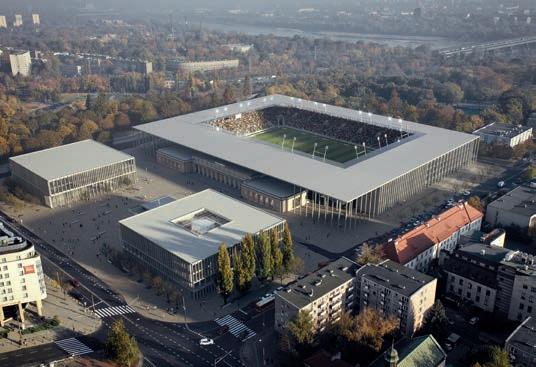
for start-ups and creative businesses, as well as opening up to the needs of the local community. The centre operator follows a substantive program, including proprietary business services, incubation and acceleration program, which promotes the development of new business initiatives.
Also worth mentioning is the innovative concession contract for the construction and maintenance of more than 1,500 bus shelters, already signed in 2014 for a period of 106 months. This project was one of the first such large PPP projects in Poland. It assumed that the investment costs, estimated at around PLN 100 million, were covered by the concessionaire. In return, the concessionaire obtained the right to exploit the advertising space on the bus shelters. Significantly, therefore, in connection with this project, the city not only did not incur any costs, but also shared in the profits from the sale of advertising space.
And what PPP projects does the city still have in the pipeline?
Among the upcoming projects, the most noteworthy is the planned renovation and development of Hala Gwardii, where we are already finalising the procedure with the existing operator as the bidder. This project assumes that the city does not bear the costs associated with the renovation of this historic space, while the private partner will be responsible for the entire investment, reaping the profits from the operation. The scope of work includes not only the renovation of Hala Gwardii, but also the reorganisation of the road system around the Hall, the devel-
opment of Wielopole Square and the construction of an underground car park. An important element in this case will be the preservation of the character of the facility and the reopening of the underground parts of the Hall to users and customers.
The second project, where we are already completing the procedure, is the construction of modern, energy-efficient kindergartens to replace the existing StolbudCiechanów-type buildings. The private partner will take care of the demolition, design and construction of the new facilities, as well as their maintenance for 20 years. The partner's remuneration will be a fee for accessibility borne by Warsaw, and kindergartens will remain under the care of the city in terms of recruitment and educational program.
A third important project at a similar stage concerns the modernisation of the Polonia Centre complex at Konwiktorska Street 6, including the construction of a multi-purpose sports hall and Sports Support Centre. Here, the private partner will be responsible for financing, construction and maintenance of the new infrastructure. The investment also provides for the modernisation of the stadium, including the renovation of the stands and supporting infrastructure.
A number of other projects are in the pipeline, including in the revitalisation area. These include the reconstruction of the Emilia furniture pavilion in a new location, the revitalisation of the Praga North area, including the city-owned part of Różyckiego Bazaar, the development of the Praski Park area, as well as the revitalisation and development of the Bema Fort area.
What market trends are influencing the selection of facilities and the concept of their development under PPPs?
Examples of initiatives such as the Targowa Creativity Centre, Hala Gwardii or Bema Fort, which is still in the preliminary concept phase, show that in the face of growing social needs, our city is moving towards creating spaces that are friendly and attractive for both residents and visitors. This is linked to our observations of consumer trends and residents' expectations of quality of life and the way they use urban space. Understanding these needs goes beyond the traditional list of administrative tasks and includes our aspirations to create a place where people want to live, work and spend time. Being residents of Warsaw ourselves, we, too, experience the benefits of such an approach. The basis of this process is the aim to increase the quality of life and offer such a cultural, entertainment and lifestyle offer that will distinguish Warsaw from other European metropolises.
Realising this vision requires bold decisions and investments that translate into long-term value for the entire community. An example of such an approach is the resignation from the sale of a valuable plot of land in the city centre in favour of creating a market hall that will give the city a unique character and meet the expectations of residents in terms of quality of life. We are therefore moving away from focusing solely on the commercial use of urban space to creating places that live and grow along with the needs of the community. Public-private partnerships are proving to be an excellent tool here, enabling projects that both enrich the city and provide quality living space for its residents.
WBJ.PL 31

NAVIGATING THE FUTURE WORKFORCE
Deloitte's latest Human Capital Trends report unveils critical challenges and opportunities in sustainable HR management, evolving productivity metrics, and fostering employee imagination, shaping the path forward for organizational success.
Unlocking Success: Insights from Deloitte's 2024 Human Capital Trends Report
According to Deloitte's 2024 Human Capital Trends report, organizations practicing sustainable human resource management nearly double their chances of reaching desired business objectives. However, less than one-fifth of leaders report using effective methods to gauge employee effectiveness amidst evolving work patterns. Another challenge is the lack of employee imagination regarding technological advancements. The twelfth Deloitte survey involved 14,000 HR leaders and management members from 95 countries, including Poland. This study uncovered trends in sustainable HR management, the development of new productivity metrics, and the need to stimulate employee imagination. Businesses addressing these issues are poised to significantly increase their likelihood of success.
32 FEBRUARY - MARCH 2024 WARSAW BUSINESS JOURNAL
Workplace | Poland. Europe’s Future
Sustainable human resource management
Amidst dynamic societal and business shifts, employee/employer relationships are straining. Over half of respondents fear work stress's detrimental impact on mental health and nearly 30 percent worry about job losses due to technology. Moreover, only 43 percent feel their current situation surpasses their initial employment status, attributing improvements to employer actions. John Guziak, leader of Deloitte's Human Capital team in Poland, underscores the importance of prioritizing people over physical assets for business success. He emphasizes that interpersonal connections drive organizational value, urging a shift towards prioritizing employee well-being.
Deloitte's proposal for sustainable human resource management outlines how organizations generate value for employees on a human level, fostering better health, skill enhancement, career opportunities, appealing work environments, equality, and a stronger sense of belonging and purpose. This approach enables mutual enhancement of organizational finances and individual output. While more than three-quarters of respondents acknowledge its importance, less than half (46 percent) enact substantial changes, with only 10 percent effectively addressing the issue. There's a perception gap between management and employees, as 89 percent of leaders claim some commitment to sustainable development, contrasted with only 41 percent agreement from employees.
Beyond productivity
Work is reliant on collaboration and the utilization of intricate yet challenging-toassess skills. Consequently, conventional productivity measures like hours worked and task duration are losing efficacy. With these shifts, three-quarters of leaders recognize the necessity for crafting novel performance metrics. Regrettably, this awareness often fails to translate into action, with only 40 percent of respondents observing organizational efforts toward developing new criteria. Many firms still prioritize tracking actions and outputs over actual outcomes.
Seventeen percent of respondents assert that their organizations effectively measure employee-generated value. Meanwhile, access to productivity data has never been greater.
We are witnessing exponential growth in data collection capabilities. This is both an opportunity and a threat – "more" in terms of data does not necessarily mean "better," especially when the quantity exceeds analytical capabilities. Organizations should ask themselves what data they should collect, how to ensure quality and convert it into indicators for better decision-making. Business is gradually moving away from measuring for its own sake and moving towards in-depth analysis of human efficiency in various dimensions – says Zbigniew Łobocki, Senior Manager, Human Capital, Deloitte.
Just over half (53 percent) of respondents indicated that their organization is exploring improved methods to gauge productivity. Deloitte's analysis suggests that transitioning towards human-centric performance metrics requires organizations to: empower employees to voice their perspectives, strive for a balance between business outcomes and human considerations, and implement protocols addressing data privacy concerns. Trust plays a pivotal role in data gathering. While both employees and leaders acknowledge this, employees express less certainty regarding the responsible use of their data. Hence, effective communication regarding data collection purposes and practices, along with empowering employees to make decisions about data collection, is imperative.
Combatting the deficit in imagination
Rapid technological advancements surpass the capacity of many organizations and workers to envision innovative work methods that fully leverage both human capabilities and technology. Almost three-quarters of respondents emphasize the importance of aligning human imagination with technological progress. However, merely nine percent of organizations effectively address this aspect. Collaboration between humans and technology poses a novel challenge for businesses. Pioneering firms foster curiosity and
Unlocking success hinges on sustainable HR management, novel productivity metrics, and stimulating employee imagination
creativity among their employees. Encouraging experimentation with new tools and exploring how emerging technologies can enhance work processes, can expedite business outcomes. This dynamic will propel companies and their workforce towards a future driven by technological innovation, asserts John Guziak.
The rise of generative AI sheds light on the overlooked benefits of human abilities and the risks of neglecting their cultivation. Curiosity and creativity often remain underdeveloped. While employees express concerns about technology replacing them, they also anticipate that generative AI will boost creativity. According to Deloitte's research, 71 percent of executives intend to leverage generative AI to enhance employee capabilities. An illustrative example of leveraging technology to amplify human potential is the establishment of digital playgrounds. These safe environments foster play and exploration, not confined to a single space or virtual platform but rather embodying a mindset where technologies are deliberately selected, empowering employees to experiment, collaborate, and envision multiple potential futures fueled by new technologies. Despite the recognition of digital solutions' importance by 65 percent of respondents, only 41 percent of organizations are actively advancing in this domain. Furthermore, while 76 percent of employees believe it's vital for their organization to assist them in envisioning how their work might evolve in the future, only 43 percent report receiving such support from their employer.
WBJ.PL 33
“
13-14
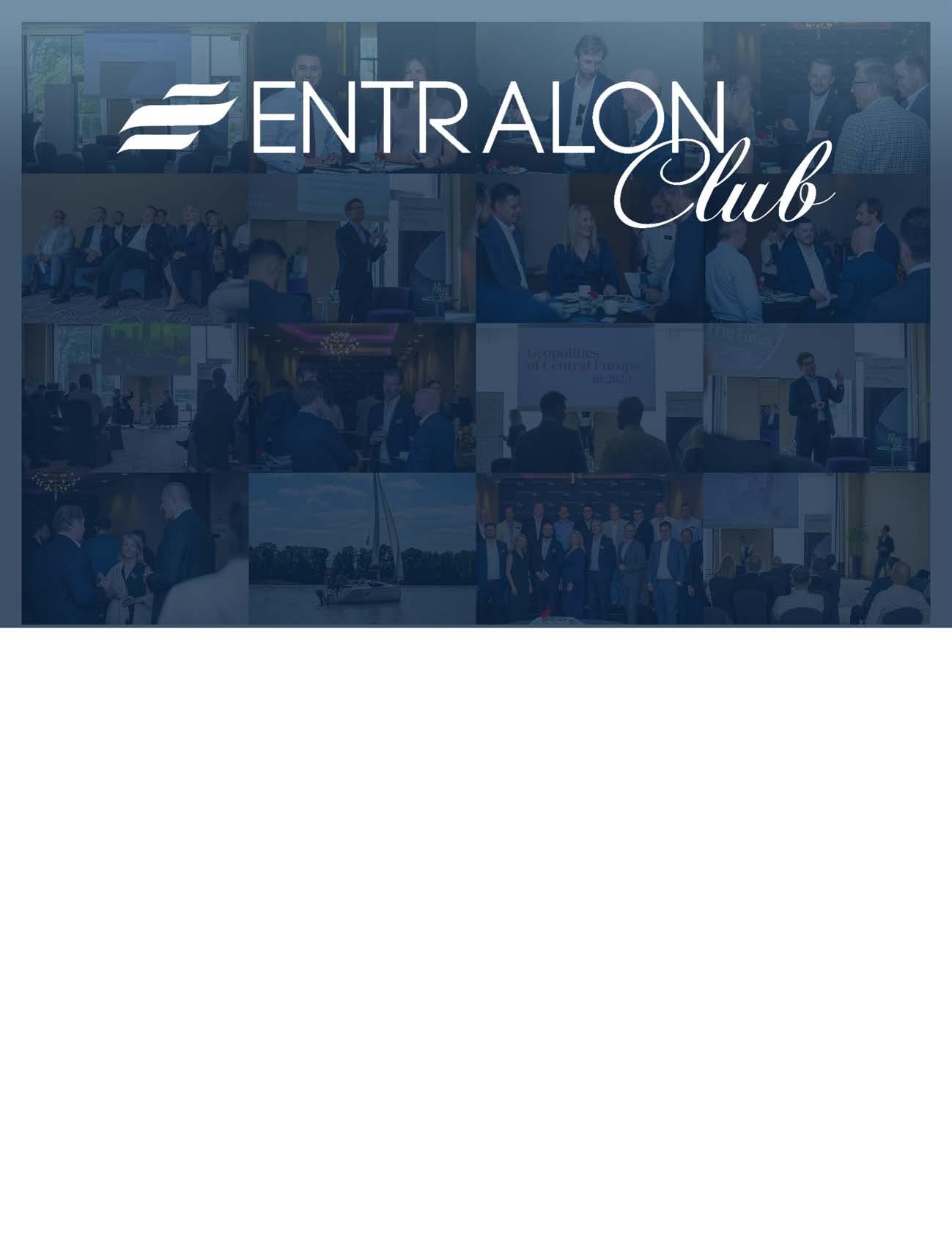

June 2024
CEE Business Retreat 2024


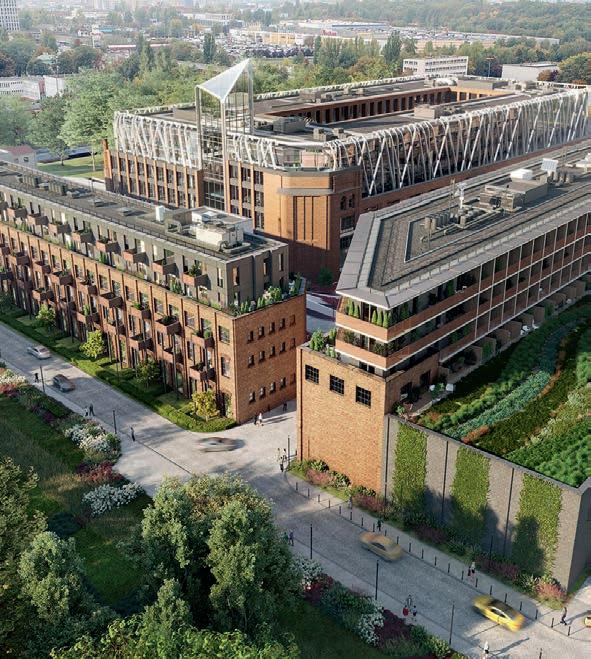
Cavatina Holding transforms building purpose in WIMA Investment, Łódź
Cavatina Holding has decided to repurpose Building A in the WIMA Widzewska Manufaktura project in Łódź from offices to apartments. The development will combine loft residential spaces with service areas and green public spaces, including a revitalized 9,000 sq m park. The revised concept aims to offer a total of 750 apartments across three buildings, alongside ground-floor service areas such as dining. Apartments ranging from 26 to 77 sq m are already available for sale in Buildings B and C, with Building A set to offer a vibrant living space and patio. Cavatina prioritizes creating a resident-friendly environment while preserving historical heritage, says Daniel Draga, vice-president of Cavatina Holding. Resi Capital manages apartment sales for the project.
WBJ.PL 35 >>> LOKALE IMMOBILIA REAL ESTATE INDUSTRY NEWS (covering) Hospitality, Investment Market,Logistics , Mixed-use, Office, Residential, Retail Find more daily at wbj.pl/real-estate COMMERCIAL
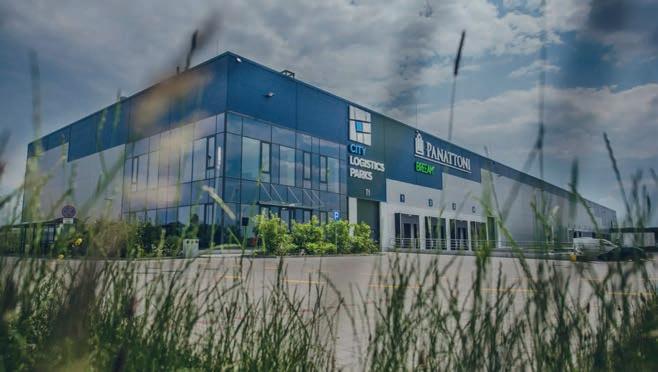
Panattoni launches City Logistics Warsaw Airport IV
Panattoni is embarking on its most significant urban project in Warsaw with City Logistics Warsaw Airport IV near Chopin Airport. The development will encompass two halls, totaling over 45,000 sq m. The initial phase will deliver 10,700 sq m, already leased to a leading logistics operator. Positioned near key transport hubs and expressways S2, S7, S79, and S8, the location facilitates efficient distribution, particularly for last-mile logistics. Sustainable features will enable BREEAM Excellent certification. Michał Samborski, Panattoni's Head of Development, highlights its strategic position and sustainable initiatives.

New residential project, Orzechowa, underway in Warsaw's Włochy district
Construction has commenced on Orzechowa, a new housing development in Warsaw's Włochy district. GH Development, a Belgian developer, aims to deliver 114 apartments and seven commercial spaces to the market by early 2026. SPS Construction serves as the general contractor for the project. Located at ul. Orzechowa 3, the apartments will range from 25 to 82 sq m and feature underground parking. GH Development is also expanding its portfolio, planning over 2.1 thousand apartments in Warsaw and acquiring additional land for future projects.
RESIDENTIAL
Dekpol looks to increase volumes and margins, eyes Warsaw
Dekpol expects their development segment to grow and improve margins in coming years. They see less volatility in material costs and aim for 2024 revenue of PLN 400 million with 500 unit sales. Warsaw expansion includes premium apartments while other cities like Wrocław are targeted for typical housing projects. Their overall 2024 sales target is 650 units across various agreements.
RESIDENTIAL
Poland’s
apartment market sees uptick in January 2024
In January 2024, Poland saw a significant uptick in the sale of new apartments, with a 62% increase compared to the previous year, totaling 4.5 thousand units. Developers responded by introducing 5.3 thousand units to the market, a 42% rise from December. Notably, the inventory reached its highest level in nine months, with 40.7 thousand units available by the end of January. Wrocław, Warsaw, and Łódź accounted for the majority of new listings. The lengthening sales time hints at a better situation for buyers, especially in Łódź and Katowice, compared to more challenging markets like Warsaw, Kraków, and Wrocław, where prices continue to rise.
36 FEBRUARY - MARCH 2024 WARSAW BUSINESS JOURNAL LOKALE IMMOBILIA NEWS
INVESTMENT
PRESS MATERIAL (4)
RESIDENTIAL
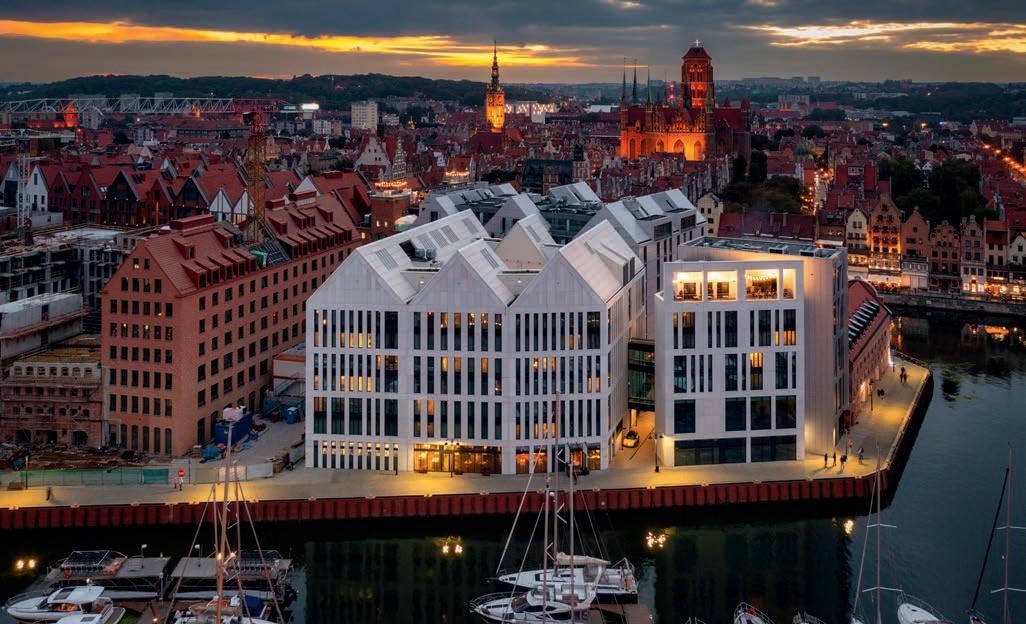
INDUSTRIAL AND TRADE
Tricity emerges as a prime investment destination in Poland
Tricity earns a remarkable rating of 8/10 in the Business Environment Assessment Study, with 18% of respondents eyeing it for investments from 2023-2025. Notably, the region sees a diverse influx of investors, ranging from IT to shared services centers and engineering projects.
Businesses acknowledge Tricity's potential, with a 7.4/10 rating for employing specialists and managers. An impressive 75% anticipate increased employment levels, particularly in the industrial and trade sectors.
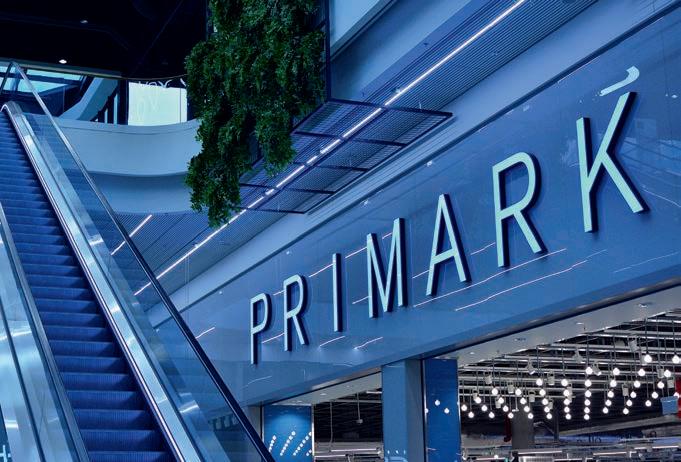
COMMERCIAL
Primark expands footprint in Poland
Primark unveils plans for its seventh Polish outlet, situated in Zielone Arkady Bydgoszcz shopping center, marking its first presence in northern Poland. The 3.2 thousand square meter store will offer a wide range of clothing, cosmetics, and home furnishings, slated to open between September 2024 and September 2025.
Maciej Podwojski, head of sales CEE at Primark, reveals ambitious expansion goals, aiming for 16 stores across six CEE countries by 2025. Additionally, the chain eyes new locations in Prague, Budapest, and Timisoara, further solidifying its presence in Central and Eastern Europe.
WBJ.PL 37 LOKALE IMMOBILIA NEWS

CEE & SEE SUMMIT IN LONDON
(by Entralon Club, hosted by EBRD, 6-7 Feb)
As the real estate market grapples with uncertainties from 2023, including looming refinancing and post-pandemic shifts, investors eye potential amid inflation spikes and global market divergences. ESG integration, logistics resilience, and office space evolution dominate discussions, while AI's transformative potential and urban regeneration projects offer glimpses of future trends. In the CEE market, investors navigate risks and rewards amidst changing landscapes and investment strategies.
By Svetlana Bagheri (Fedosova)
Keynote: Economic Outlook 2024
With 2023 being notably tough, the outlook for 2024 reflects the challenges of the preceding year and presents increasing difficulties. A looming refinancing cloud adds to uncertainties, while people reconsider how real estate is used post-pandemic. Key considerations include bond market volatility and asset repricing, with an overall moderately positive outlook expected as inflation, though spiked, is projected to decline, potentially opening the door for interest rate cuts by central banks, slated to commence in the first half of 2024.
Global contrasts between investment and occupier markets emerge, with capital values decreasing while rents rise, presenting buying opportunities. However, challenges persist, with rising office vacancy rates and a sharp decline in construction activity. Occupiers prioritize spaces that enhance productivity, brand, and employee well-being, underlining a shift towards collaborative and flexible environments.
As transaction volumes halved in 2023, buyers await assets repricing, while lenders adopt stricter criteria. Nonetheless, signs of price stabilization, particularly in residential markets, are emerging, motivating certain owners to sell. Additionally, occupier-centric strategies gain traction, with a focus on investing in future-proof assets with compelling customer propositions.
IMMOBILIA
38 FEBRUARY - MARCH 2024 WARSAW BUSINESS JOURNAL
LOKALE
EVENT REPORT
PHOTOGRAPHS COURTESY OF ENTRALON CLUB
ESG & Decarbonization: "How do we find value out of the high investment?"
The panel discussion explored how investors can derive value from sustainable investments. Opportunities were identified in energy efficiency initiatives, which not only contribute to better returns but also cater to the rising demand for low-carbon buildings. Institutional investors are driving demand for ESG certified buildings, with regulations at the state level supporting this trend. A long-term perspective is crucial, especially for existing portfolios, as non-compliant buildings may leave the prime segment and face discounts upon exit.
Renewable energy sources, such as solar panels, were discussed as viable options, particularly for logistics and industrial properties, with a phased approach recommended for energy load reduction and subsequent solar installation to avoid excessive generation.
Furthermore, the panel emphasized the importance of taking a broader view beyond net-zero goals, focusing on restoring the environment and creating people-centric spaces. Social aspects, such as addressing occupant needs, were highlighted as integral to maintaining asset values. Key advice included conducting risk assessments, meticulous planning, and prioritizing data acquisition, alongside raising awareness within organizations about the significance of ESG considerations.
Logistics: "Fundamentally strong or challenged by pricing adjustment?"
The panel discussion highlighted the resilience of the sector despite the pandemic. Logistics emerged as the most attractive option for investors, with Poland leading the recovery and gaining recognition as a distribution hub for the CEE region.
The rise of e-commerce has fueled demand for modern logistics facilities, prompting significant investment in state-of-the-art warehouses and distribution centers. Furthermore, the sector is witnessing increasing automation and digitalization, as companies leverage technology to optimize supply chain operations and enhance efficiency. With strong fundamentals, the outlook for the logistics sector remains positive in the region.
Unlocking Opportunities: "Hospitality Trends and Strategies"
The panel discussion on the hospitality sector addressed several challenges facing the industry, including staffing issues related to seasonality. Notably, inflation and rising construction costs emerged as significant concerns, affecting both operational and investment aspects of the sector.
The overarching goals discussed were to maintain sustainable tourism practices and to elevate living standards in tourist areas, emphasizing the importance of cultural tourism.
Despite the challenges posed by the COVID-19 pandemic, there was optimism about the availability of bank financing, with suggestions to focus on product enhancement and capital efficiency to secure funding.
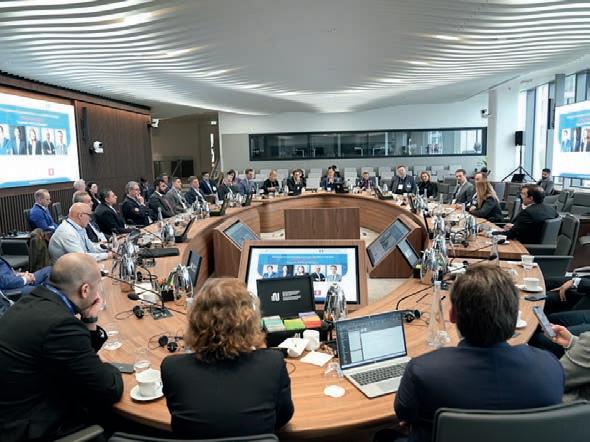
In summary, while acknowledging the current difficulties, the panel emphasized the industry's resilience and the collective anticipation for better times ahead, underlining the importance of perseverance and continuous improvement in navigating the current landscape.
Invest in Ukraine: "Challenges vs Opportunities vs Timing"
The panel discussion highlighted several key points regarding the country's economic landscape and investment potential. Participants shared their views on gaps between perception and reality when it comes to investing in Ukraine, with on-the-ground experiences differing from external perceptions. Despite past and current challenges, the Ukrainian economy demonstrated resilience, with recordhigh currency reserves, relatively low inflation, stable exchange rates, and low vacancy rates observed in retail and logistics sectors.
The panel underscored Ukraine's ongoing efforts to combat corruption, which have improved the country's attractiveness to investors. While some investors may adopt a cautious approach and wait for the resolution of ongoing conflicts, there was a general consensus that Ukraine is safer than it used to be, with opportunities for investment, particularly in logistics properties and land. The European Bank for Reconstruction and Development emerged as a largest foreign investor in the country in the last two years.
During the session, the discussion touched on property valuation methods, the challenge of finding employees, prevailing yield rates, and financing options in the market. Despite some constraints, such as limited debt financing and capital controls, there is anticipation of increased institutional investment if Ukraine joins NATO.
Future Offices: "What's the new recipe for success?"
The discussion covered various key themes
WBJ.PL 39
LOKALE IMMOBILIA EVENT REPORT
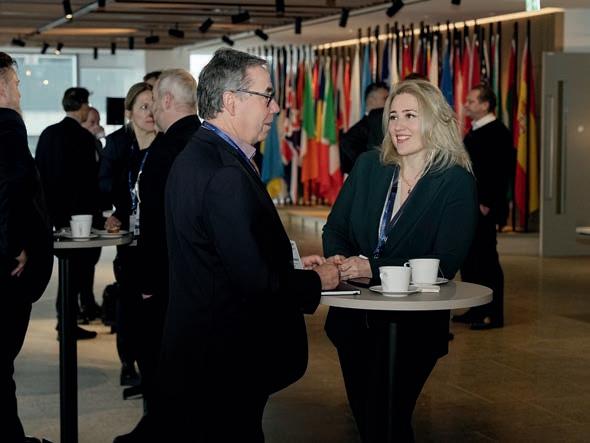
shaping the evolving landscape of office spaces. There was an acknowledgment of the gap between seller and buyer expectations, with the ongoing post-pandemic recovery adding to the complexity. Changes in the relationship between landlords and tenants were also noted, reflecting shifting dynamics in the commercial real estate market.
Participants highlighted commuting time differences between CEE and Western Europe, influencing preferences for office work arrangements. The growth of shared service centers in CEE was discussed, with expectations of continued expansion. Liquidity emerged as a challenge in the market, with concerns raised about the potential impact on valuations.
Key customer requirements for office spaces were identified as location and quality.
Additionally, there was recognition of the increasing importance of ESG (Environmental, Social, and Governance) considerations, perceived not just as a cost but also as a crucial aspect of protecting businesses in the long term.
Founders' roundtable "Deal flow and diversification for sustainable business"
Founders from various countries, including the Czech Republic, Poland, and Greece, recounted their entrepreneurial journeys and illustrated that success is clearly attainable in the region.
The panel delved into the traits distinguishing entrepreneurs from employees, focusing on the ability to navigate risks and uncertainties, identify personal talents, establish core principles, and bear responsibility for capital and employees. They stressed the importance of resilience, advocating for the transformation of setbacks into strengths. Moreover, the discussion offered insights on determining one's suitability for entrepreneurship and the possibility of acquiring entrepreneurial skills through employment. The founders highlighted the value of chance encounters
and the significance of not always being the smartest person in the room. Luck, they suggested, plays a role, alongside the necessity of networking with the right individuals.
Incorporating a green aspect into business operations was a topic of discussion, reflecting a commitment to meeting tenants' needs and fostering community-centered buildings. Strategies for crisis survival were also shared, highlighting the importance of vision, adaptability, and learning from historical precedents. Ultimately, the panel underscored the importance of a high-quality product and access to capital and emphasized the fundamental role of family and health as pillars of support.
Investment landscape in CEE RE market: "Balancing between opportunities and challenges"
The panel delved into the investment landscape of CEE, assessing the challenges and opportunities following the COVID-19 pandemic in light of the events of 2023, including high inflation and the implications of the conflict in Ukraine. Transaction activity in the region slowed down, with capital becoming increasingly local. The repricing of assets in the real estate sector varied across different geographies, with new projects facing profitability challenges due to current interest rates.
Navigating the high-interest rate environment was a key topic of discussion, with expectations of lower rates this year and improvements observed in swap rates since October 2023. The panel also noted differences in demand between CEE and Western Europe and highlighted the anticipated return of institutional investors to CEE markets, emphasizing the need to educate them on the region's market dynamics and GDP growth prospects.
Additionally, there was discussion on the transition towards sustainability in the office sector, reflecting broader trends towards environmental responsibility and green investment practices.
PRS: "Reaching balance in maturity, supply, and pricing?"
The Private Rented Sector (PRS) in CEE has experienced notable growth driven by urbanization, demographic shifts, and evolving lifestyle preferences. Rising demand for rental housing, particularly in urban areas where property prices are high and homeownership is less attainable, has spurred the expansion of the PRS. This trend is further supported by increasing institutional investment in purpose-built rental accommodation, as investors recognize the potential for stable returns from rental income in the region.
With the right regulatory environment and investment incentives, the PRS has the po-
40 FEBRUARY - MARCH 2024 WARSAW BUSINESS JOURNAL
PHOTOGRAPHS COURTESY OF ENTRALON CLUB
tential to play a significant role in meeting the housing needs of urban populations, offering flexibility and mobility to renters. PRS is already a recognized asset class for both equity investors and senior lenders. Participants discussed ways of addressing undersupply in the market and the importance of ESG aspects.
Urban regeneration: "Cities of opportunities"
A spirited discussion ensued following presentations showcasing two examples of urban redevelopment. The first example showcased a waterfront brownfield site located in Šibenik, representing Croatia's inaugural public-private partnership project. The second example highlighted a completed regeneration project of an old factory in downtown Warsaw, Poland.
Both projects encapsulated the concept of mixed-use development, revitalizing entire neighborhoods. Participants delved into the distinctions between brownfield and greenfield projects, explored aspects of project finance, and underscored the significance of long-term planning in urban development.
AI and digitization in RE: "When and how is it going to change the game for real estate?"
The panel discussion focused on the transformative impact of artificial intelligence (AI) in the real estate sector, highlighting its potential as a game-changing technology that is not yet fully understood. The affordability and accessibility of AI technology were cited as key drivers for its current prominence, enabling significant performance enhancements for employees and facilitating more creative work. Real-time data availability was emphasized as a crucial benefit, aiding in better asset performance through measures such as reducing electricity consumption and enabling predictive maintenance in real estate.
Various applications of AI were explored, including its role in accelerating deal underwriting processes for investors, monitoring thousands of properties by collecting and providing data and identifying hidden market drivers. However, the panel also acknowledged the challenges associated with AI, such as the potential risk of intellectual property leaks when feeding AI with confidential information and concerns about job displacement as automation reduces the need for human labor.
Furthermore, the discussion highlighted Europe's lag behind the US and China in AI development, attributing this partly to restrictive regulations in the EU.
For more information about Entralon Club please follow: www.entralon.club and email at admin@entralon.club
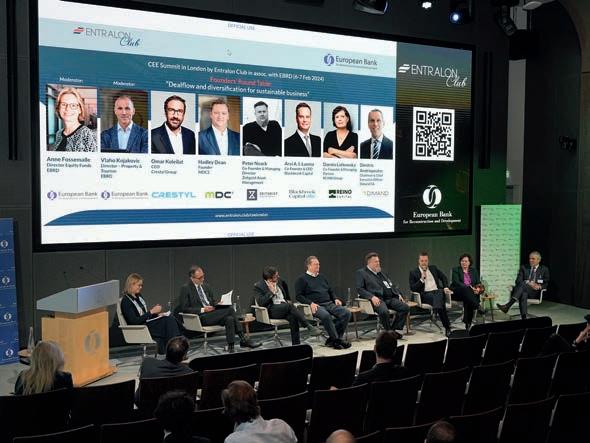
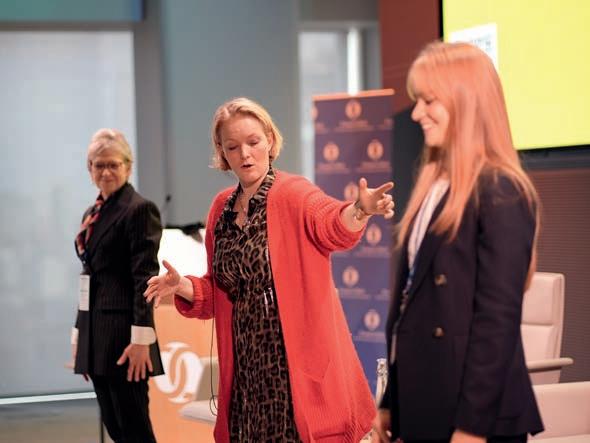
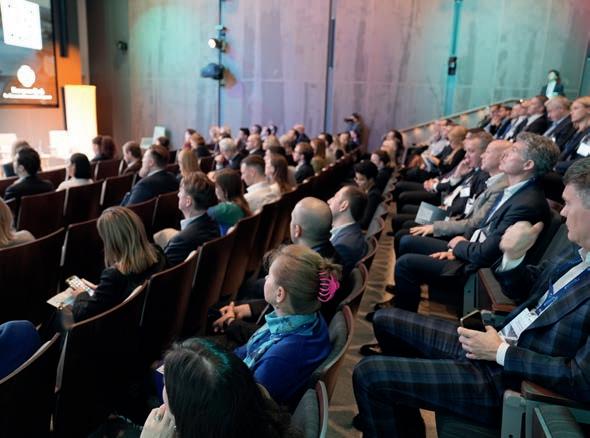
WBJ.PL 41

A project that will benefit the entire city
AArchicom transforms a deserted place full of concrete near Domaniewska Street into an attractive place to live and thrive.
rchicom, a nationwide Polish developer and part of the Echo Group, is spearheading the development of Modern Mokotów, envisioned as a 15-minute city designed for convenient living amidst abundant green spaces, amenities, and comfortable apartments. The investor aims to transform the entire urban block of the industrial Służewiec district, once home to factories producing electronics and lifts, and later dubbed “Warsaw’s Mordor”. This transformation will culminate in a city-shaping project where essential amenities are easily accessible.
Archicom will convert the formerly neglected office space, creating an
attractive place to live and spend free time with mostly residential development, which will blend seamlessly with public green areas and services. The finished project will be a mixed-use complex in the form of a 15-minute city, offering convenient access to all essential services within a short walk or bike ride.
“Our previous successful projects, such as the Warsaw Breweries and Fuzja in the city of Łódź, serve as testament to our ability to craft enticing living environments. These successes assure residents of the capital that they can expect quality and comfortable living conditions. The urban block, located at Wołoska, Domaniewska, Marynarska, and Postępu Streets has incredible potential, which we would like
42 FEBRUARY - MARCH 2024 WARSAW BUSINESS JOURNAL
MODERN MOKOTÓW PRESS MATERIALS
to unleash not only for future residents of the project but also for all those who wish to enjoy appetizing dishes in restaurants, drink their morning coffee or shop in an artisan bakery. I can assure you that we will effectively redefine this part of the Mokotów district and emerge from the shadow of “Warsaw's Mordor” by creating a micro-district known for its desirability as a residential and leisure destination,” assures Dawid Wrona, Managing Director for Sales and Marketing at Archicom.
Modern Mokotów will be built in a place that has undergone significant transformation over the years. Once predominantly agricultural, it later embraced the industrial revolution, followed by the proliferation of office buildings. The latest concept of the Polish developer is to create a friendly and functional urban block without fences. The initial phase of the project will see the construction of three buildings comprising over five hundred apartments. Next to the development, several green courtyards featuring small architectural elements will offer spaces for relaxation and recreation. The opening phase will feature an exclusive building of higher standards, named Apartamenty przy Kwitnącej Wiśnicej, housing 40 comfortable apartments ranging from studios to five-room units with floor areas up to 142 square meters. A green area with a playground will be adjacent to the apartment building.
Nature will replace the vastness of concrete
Imagine it being a lazy Sunday afternoon. The rays of spring sunshine pleasantly caress strollers longing for warmth, while the little ones take advantage of the weather to kick a ball around with their parents or race their bikes. Sounds delightful, doesn’t it? Well, it’s not just a pleasant thought; it will soon become a reality in Modern Mokotów! To enhance the redeveloped micro-district along Wołoska Street, the architects from the renowned BBGK design studio have proposed a linear park spanning 1.5 hectares. This green space, characterized by its elongated shape, will offer recreational and ecological benefits, while providing

a tranquil retreat from the hustle and bustle of the nearby busy street. Serving as the centerpiece of the block will be Aleja Lipowa (Lime Avenue), prioritizing pedestrians and cyclists. Additionally, over 2 hectares of lawns, trees, shrubs, and plants are planned within the estate. A green neighborhood path will invite visitors for a walk along the playground and peaceful Gardens of Three Colors, comprising green courtyards with distinct themes. The extensive ecosystem, replacing the concrete car park, will be sustained by reclaimed rainwater for watering the bioactive area.
Archicom was inspired by the concept model of sustainable neighborhoods
Modern Mokotów will epitomize the potential of a vibrant city, offering not just residences but also easy access to a comprehensive urban infrastructure. This friendly complex will provide outdoor fitness and cross-fit areas, a calisthenics space, a cycle track, a boules and mini-golf area, as well as a cosy amphitheater. Apartment owners will also benefit from coworking spaces and a storage room for prams. The youngest will be able to spend time outdoors using three safe and well-equipped playgrounds, an outdoor playing area and a recreational hillock. Along Wołoska Street, an arcade featuring cafes, restaurants, bakeries, shops and services is planned. Furthermore, Plac
Przemiany (Transformation Square), an attractive meeting spot within the development, will be surrounded by boutiques and eateries offering cuisine from around the world.
Modern Mokotów is much more than just a place to live Archicom is poised to breathe new life into previously concrete-covered spaces, establishing a fresh urban hub for Warsaw residents. This bold metamorphosis will change the nature of the former industrial and office areas in the strategic heart of Warsaw's Służewiec district. By aligning with global trends in designing friendly and multifunctional living spaces, the developer aims to strike a balance that seamlessly integrates city living with nature, catering to residents’ needs and providing convenient access to essential amenities. In this way, Archicom aims to become a developer of choice by creating a unique district, where everything residents require is within easy reach.
For more information visit; www.modernmokotow.pl
SCAN FOR MORE DETAILS
WBJ.PL 43
PARTNER SPOTLIGHT

Harmonizing Supply Chain Dynamics: The Vital Role of Logistics Flexibility
How can logistics firms adapt to meet the evolving demands of fresh produce supply chains?
Exploring the intersection of business agility, standardization, and continuous improvement.
The logistics operator is an important link in harmonizing the preferences of all supply chain participants, thus ensuring fresh and timely deliveries. How can logistics company's business flexibility contribute to effectively meeting and balancing the needs of all stakeholders?
The current supply chain structure in the fresh produce sector is in and of itself extremely demanding, encompassing both producers and consumers. Consumers expecting the highest quality goods and services are the main drivers of this phenomenon. The essence of this trend lies in the conscious decisions made by consumers, who strive to choose products of the best quality that are safe to eat, and are aligned with their personal preferences and lifestyles. For logisticians, therefore, it is a real challenge to meet the high demands of the market.
Engaging in dialogue with contractors,
with both clients and service recipients, and to listen to their expectations and understand their directions, is key. Partnering with them to create services that align with future market expectations, is crucial for developing and maintaining the organization’s business agility.
Standardization is one of the tools that significantly support business agility in an enterprise. It is the process of introducing standards in an organization, understood as the best way to perform a process at a given time. However, a question arises: Does the introduction of standards make the company rigid? Does it close the organization to change and limit employee creativity? Nothing could be further from the truth. The use of standards by companies supports the predictability and stability of processes and their safety. At the same time it is a basis for reflection on how to perform the process efficiently. On the other hand, it is important to remember that for
standardization to support business agility, it cannot be the goal itself. The overriding intention is to bring about a situation where standardization, together with continuous improvement, builds stability and process efficiency in the company.
For a standard to effectively fulfill its role, it must have the right characteristics. First, it must be established; that is, all stakeholders agree on how the process is to be carried out. Secondly, it must be written down, i.e. there must be documentation describing how the process works. Third, it is known; employees have been trained on the standard, and it is applied, which means that employees follow the process according to the established standard.
The implementation and application of standards create opportunities for continuous improvement, which is the business culture at Fresh Logistics Poland. Standards are regularly reviewed and reflected upon. What does this mean? In
44 FEBRUARY - MARCH 2024 WARSAW BUSINESS JOURNAL
PARTNER SPOTLIGHT PRESS MATERIAL
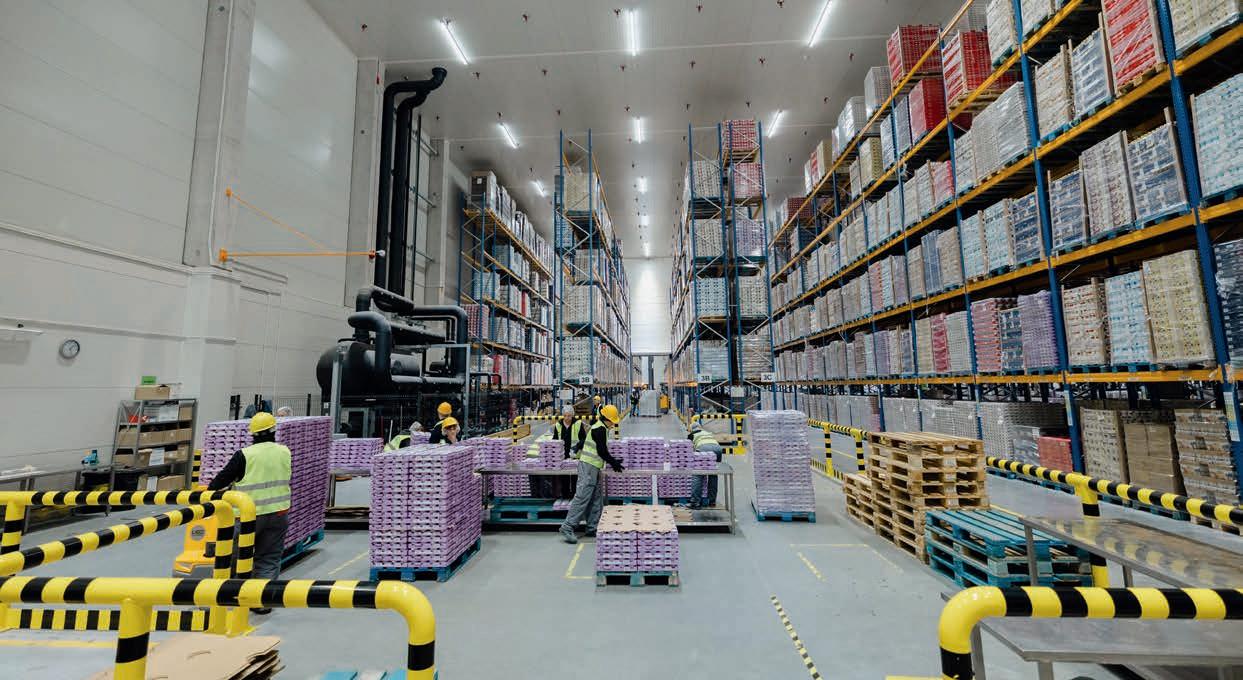
our organization, we constantly measure processes and check whether the established standard is applied. At the same time, we subject the entire process to reflection, that is, the existing status quo is questioned in terms of, for example, market expectations.
Verification and reflection, integral elements of continuous improvement, often prompt organization to revise their standards. The effect of such a change can be the realization of more ambitious quality goals, further building a competitive advantage or adapting the process to changing market expectations. Thanks to standardization, the organization has a great base for undertaking improvement activities. Thanks to such practices, the quality of delivery at Fresh Logistics Polska has been at a high level for years.
Last but not least, in line with our prevailing principle of "Better Every Day," we actively seek improvements and improve processes daily. Without this commitment, we would not be able to propel our business to the next level, especially during times of heightened market expectations. Cooperation and mutual understanding among all participants in the supply chain are also critical. Today, merely having a
large fleet of vehicles is insufficient. It is essential that all of the company's internal units work together, along with shippers and receivers, to achieve synergies. Without this, long-term development in our industry would be unattainable.
Today, consumers value predictability, security and freshness of delivered goods. Therefore, logistics operators who understand market mechanisms should bet on standardization as a step towards process stability and predictability, while simultaneously focusing on continuous improvement in processes and services offered. This allows them to respond quickly to changing market expectations, thus offering their customers a sense of security and stability of cooperation.
Consumers value predictability, security, and freshness. Logistics operators must prioritize stability while embracing change to meet market expectations.
 Maja Kierzek-Piotrowska
Maja Kierzek-Piotrowska
SCAN FOR MORE DETAILS
Business Process Integration Director, Fresh Logistics Polska, Raben Group
WBJ.PL 45

TOURISM ON THE RISE IN POLAND
Poland is one of the few countries in the Central and Eastern European region where air traffic has mostly recovered, post pandemic. This increase is in part due to Poland’s central location, but other factors are at play, including flight range preference, the war in Ukraine and the conflict in Israel. What’s more, Poland’s location provides a crossroads for travel between other EU countries, especially for those looking for some good old fashioned hospitality.
BY SEAN REYNAUD
46 FEBRUARY - MARCH 2024 WARSAW BUSINESS JOURNAL
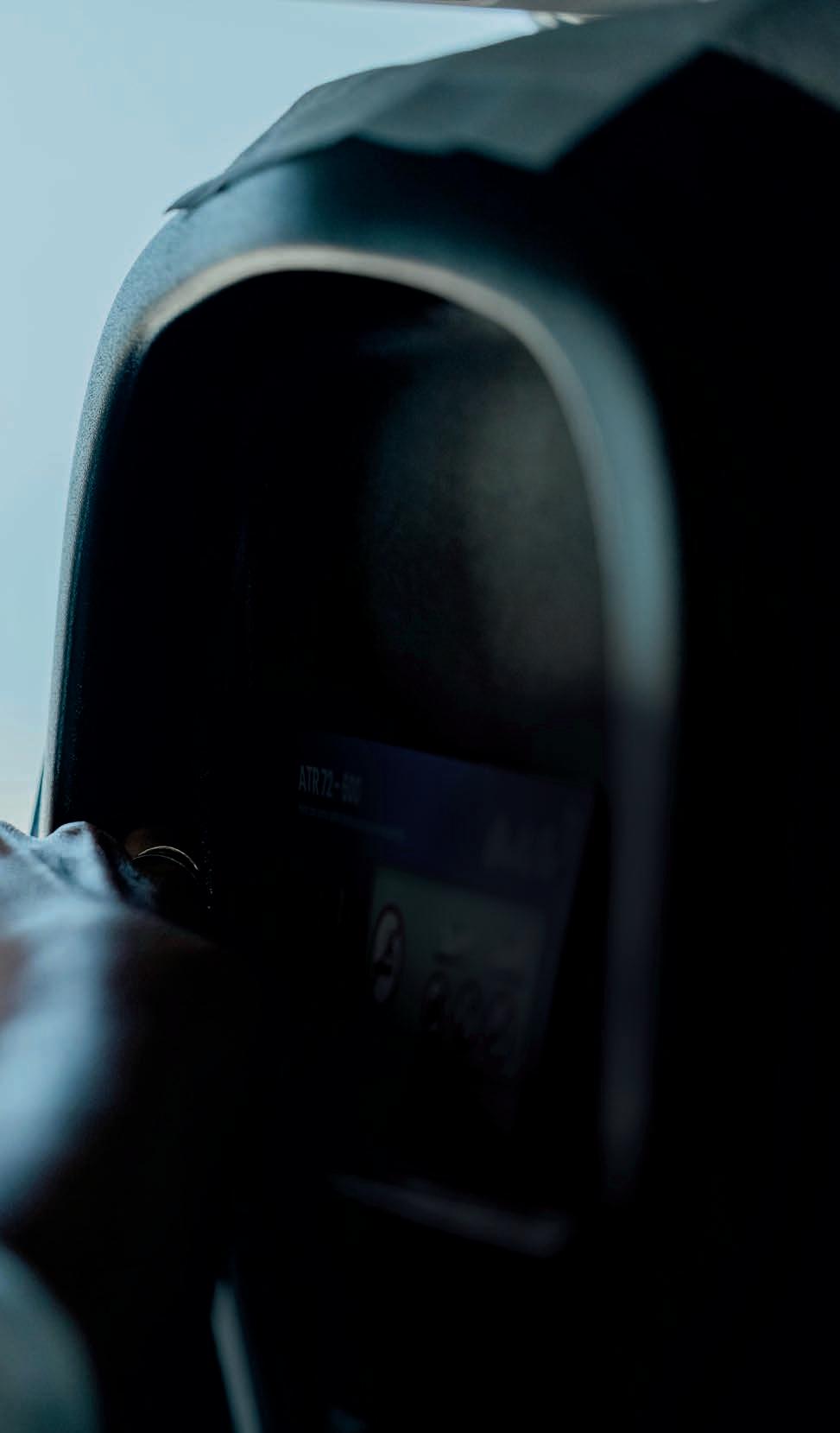
AIR TRAVEL OVERALL
In 2023, global air travel saw surged among international tourists across various regions compared to the previous year. However, one conspicuous exception was the Middle East, where travel activity continued to fall short of pre-pandemic levels. In terms of inbound travelers, Europe emerged as the leading destination, attracting an estimated 700 million arrivals.
According to the European Travel Commission (ETC), Poland is unique among other ECC countries with an increase in passenger traffic of 4.5%. In 2023 over 52 million passengers passed through regional airports, which is seven million more than in 2022.
POLAND’S LOT?
Poland has a very strong carrier hub network, represented by PLL LOT. This concentration of air traffic is significant. Poland also benefits from a diverse array of regional airports, contributing to a broader range of destinations. Unlike some neighboring countries such as Slovakia or the Czech Republic, Poland's regional airports, favored by low-cost carriers, are more evenly spread out. Therefore, air traffic within Poland is more evenly distributed and varied. While long-distance travel to Poland remains relatively modest, the country has seen favorable trends in shorter and medium-length journeys.
Germany, serving as an international hub for longhaul flights to and from Eastern destinations, has experienced a decline in flight volume due to the conflict in Ukraine. Countries at odds with Russia, like many Scandinavian countries, are no longer allowed to fly through the so-called Siberian Corridor, hence severing airlines from direct flights to Asia. Flights from China to Scandinavian countries do not have this issue, as China is on friendly terms with Russia. Sanctions on Russia and reciprocal flight bans have reshaped commercial flight routes and will have lasting effects on the industry, even after the conflict subsides.
Poland has fewer flights of this nature. That’s not to say that long-haul flights skip Chopin Airport, but that at the moment these flights are not Poland’s bread and butter. Poland benefits from short to medium-ranged flights. Regional flights, coming into and out of Kraków, Gdańsk, Katowice (the largest leisure travel airport in Poland), Wrocław and others, make up the vast majority of flights.
THE DRAW
Poland, since its accession to the European Union, in 2004, draws an increasing number of tourists annually. Popular destinations include the Baltic Sea coast, Masurian Lake District, Białowieża Forest, and the southern mountain regions.
Foreign visitors are attracted to Poland for city breaks, national parks, lakes, museums and historic or UNESCO sites. International tourist spending in Poland reached nearly PLN 26.4 billion in 2022, reflecting the country's appeal. One neighbor in particular casts a wandering eye over what is available up north.
CZECH YOUR BAGS
The influx of Czech tourists to Poland for summer holidays has surged, as indicated by data from travel agencies and local authorities. Visitors from landlocked Czechia are flocking to Poland's Baltic Sea coast, marking a significant shift in travel preferences.
“For the first time ever, we are seeing that Poland is among the most popular summer destinations,” Ladislav Veselý, director of the Czech booking portal Slevomat, told the Czech edition of Forbes. Veselý, highlights this trend, citing a 50% increase in sales of stays in Poland since last year, with Baltic coast destinations leading the pack.
The allure of Poland's pristine beaches, less crowded compared to other popular spots, has captured Czech holiday-makers' attention. This sentiment is echoed by other travel agencies, with a notable 158% rise in interest in Polish holidays reported by Dovolena.cz.
Jiřina Ekrt Jirušková, spokeswoman for travel company Invia, attributes Poland's appeal to its diverse offerings and affordability compared to Czechia. Rising costs in Croatia, exacerbated by the introduction of the euro, have also redirected Czech tourists towards Poland.
The growing presence of Czech tourists hasn't gone unnoticed in Poland, with resort towns like Sopot experiencing increased footfall from Czech visitors. Improved transport infrastructure, including new flight routes, has facilitated easier access to Poland's coastal regions.
Overall, Poland's charm, combined with its affordability and accessibility, has solidified its position as a sought-after holiday destination for Czech travelers.
WBJ.PL 47
THE CZECHS ARE NOT ALONE
In January-November 2023, foreign tourist arrivals in Poland rose to 6,526,000 compared to 5,329,000 in the same period in 2022, with Germany leading the influx at over 1,500,000 tourists. Of course December, with its festive celebrations, was also a popular time for foreign tourists, drawing 517,400 visitors in 2022. Increased arrivals from markets like the Czech Republic, Lithuania, and the USA indicate a positive rebound compared to pre-COVID-19 levels.
Furthermore, the opening of organized tours from China in August 2023 presents promising opportunities for growth, fueled by positive feedback on Polish culture and hospitality. In 2023, hotels in regions like Małopolska, Pomerania, and Warmia-Mazury were favored for overnight stays, with some near Wrocław and the Tri-City chosen for business trips due to the concentration of foreign investments in these areas.
In the first three quarters of 2023, total revenues of cultural institutions saw a significant increase of 17.1% compared to the previous year, reaching PLN 10,494.3 million. These revenues primarily stemmed from net sales of products, goods, and materials (92.4%), supplemented by other operating revenues (7.3%) and financial revenues (0.3%). Interestingly, over a quarter of these revenues were generated by cultural institutions in Mazowieckie Voivodship.
On average, each cultural institution amassed PLN 2,2.23 million in total revenues. In total, all national cultural institutions contributed PLN 2,012.2 million, while local government institutions accounted for PLN 8,482.1 million. Arts facilities played a prominent role, comprising 41.1% of total revenues.
Yet inflation had something to say: total costs rose by 15.7% to PLN 9,849.4 million, primarily driven by operating costs (98.8%). The gross financial result stood at PLN 644.8 million, with a net financial result of PLN 643.5 million, representing a 30.3% increase in net profit compared to the previous year (2022).
SO, WE’RE BACK?
Don’t break out the champaign yet. The share of total gross domestic product generated by the global travel and tourism industry in 2022, has yet to catch up with pre-pandemic levels. In 2019, the share of GDP from travel and tourism was 10.4%. By 2022 it shrank to 7.6%. In 2023 there was a slight increase up to 9.2% of GDP. Europe retains its position as the leading region for travel and tourism, but neither the EU nor Poland has fully recovered.
CAN POLAND GRAB MORE OF THAT TOURISM PIE?
In 2023, the European Union witnessed a remarkable re-
bound in tourism, marking a record year for the accommodation industry with 2.92 billion nights spent, surpassing pre-pandemic levels by 1.6%. This resurgence was fueled by increased visits from both foreign and domestic travelers, with 171 million more overnight stays compared to 2022. Nearly all EU member states experienced growth, albeit modest in some cases, while Poland saw a 3% increase in overnight stays.
However, the pace of recovery in Poland lags behind its Western European counterparts, indicating a slower return to pre-pandemic levels. By January 2024, the hotel industry in Poland faced a weaker performance compared to 2023. The beginning of the holiday season in the latter part of the month provided a slight boost for recreational facilities, but overall, the outlook remains bleak. Data from the Polish Chamber of Commerce for Hotel Industry (IGHP) revealed that nearly half of hotels experienced a decline in occupancy rates compared to the same period last year, particularly impacting business hotels.
As average prices increased the rate of growth slowed down. The continuation of school holidays throughout February offered some hope for leisure hotels, but overall expectations remain subdued.
According to the latest European Federation for Living (EFL) survey, there's a notable shift in optimism within the hospitality sector, with 20% of hotels, restaurants, and catering businesses anticipating an increase in orders in the upcoming months, compared to a mere 5% in the previous quarter. This surge in optimism is reflected in the EFL Barometer sub-index for the HoReCa sector, which reached 50.1 points, the highest opening in four years.
The positive outlook is fueled by expectations of higher revenues and increased investment outlays, marking a significant departure from previous quarters. This optimism extends beyond the holiday season, indicating a broader resurgence in the hotel and restaurant industry throughout 2024.
There's a notable uptick in the percentage of businesses considering larger investments, indicating a growing confidence in future growth prospects. However, the need for external financing has diminished, suggesting a more cautious approach to capital allocation. Overall, the EFL Barometer for the first quarter of 2024 signals opportunities for development in the SME sector, reflecting a renewed sense of optimism and resilience within the hospitality industry.
As the weather warms up expect to see more flights, more bookings, more money being spent in Poland. Tourists can rely on good food, safe environments and the warmth of the people.
48 FEBRUARY - MARCH 2024 WARSAW BUSINESS JOURNAL
FEATURE
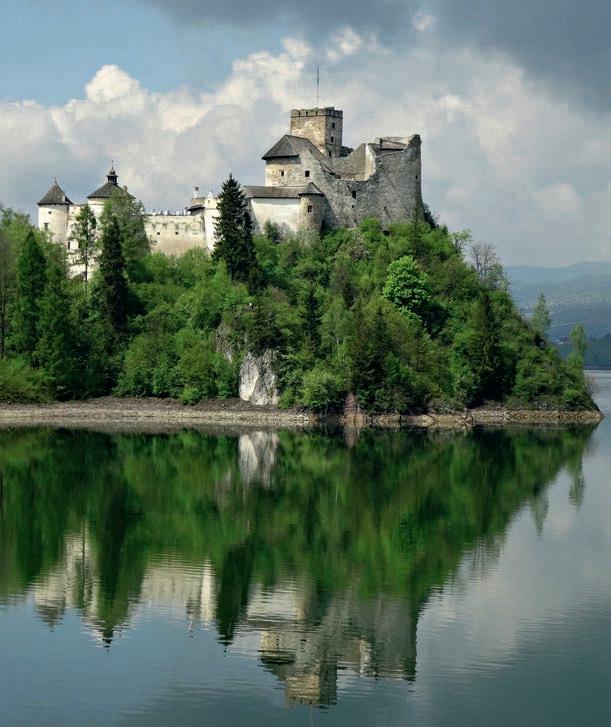

“For the first time ever, we are seeing that Poland is among the most popular summer destinations,”
Ladislav Veselý, director of the Czech booking portal Slevomat
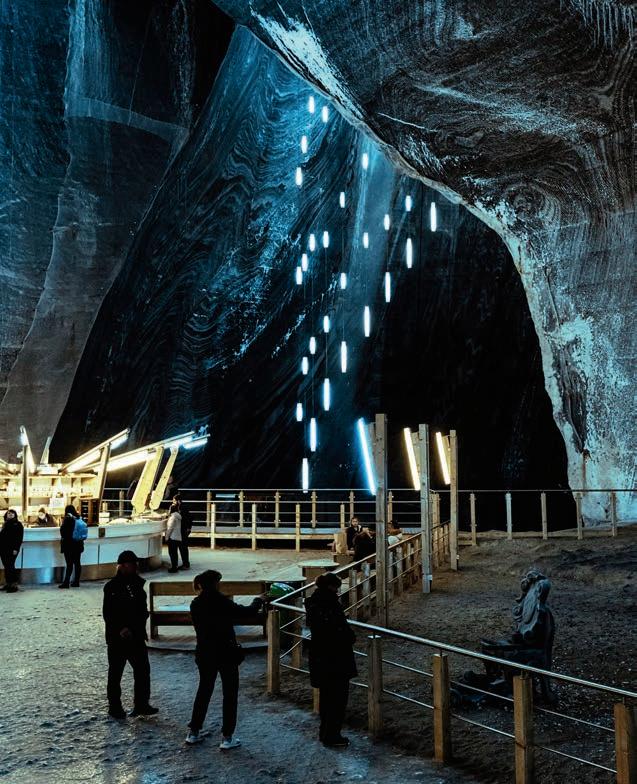
WBJ.PL 49
Clockwise from left: Niedzica Castle, Wieliczka Salt Mine, and beaches on Hel Peninsula—popular tourist destinations in Poland.

FEATURE

DON’T BE AFRAID OF FAILURE
Poland’s transition towards green energy has not been without challenges. Renewable energy can be unpredictable and requires more management to be fully efficient. WBJ sat down with Sonam Parashar , a postdoc researcher at IDEAS NCBR to talk about the opportunities and challenges of renewable energy in Poland, and how AI can even the playing field.
INTERVIEW BY
BEATA SOCHA
WBJ:
What’s the one trait that every scientist should have?
Sonam Parashar: A good scientist should not be afraid of failure and should be persistent and patient.
How do you think this mindset reconciles with working in Poland, and a publicly-funded institution, like IDEAS NCBR? Research is incomplete without experiments, and experiments do not guarantee success but provide learning to improve further. IDEAS NCBR provides a positive research environment for scientists, giving them the freedom to experiment and improvise solutions to achieve the best results for real-world applications, develop their concepts, and provide better resources, conditions, and interdisciplinary collaboration.
What inspired you to become a scientist?
I am a curious person, always interested in finding relationships to connect different fields of science, bridging research gaps, and observing outcomes in the real world. As an electrical engineer, I have always been fascinated by automation, new technologies, computers, and programming languages.
I felt a strong desire to explore AI techniques in electrical engineering applications due to their complexity and the myriad of technicalities involved. Consequently, I focused my projects at the intersection of AI and electrical engineering, culminating in both master’s and doctoral theses aimed at advancing technology in the field of power and energy systems, especially energy transition.
What did your transition to doing research in Poland look like?
The transition to conducting research in Poland has been good, especially in terms of collaborating with interdisciplinary teams. It’s always enriching to consider diverse perspectives when addressing research challenges, which adds depth and color to the work. I’m grateful to IDEAS for providing me with the opportunity to expand my knowledge of AI and supporting me in addressing large-scale energy transition research problems through cooperation with other experts.
This transition has also provided me the chance to connect with international researchers from various fields and engage in fruitful collaborations. Additionally, I have gained insights into the working culture in Poland, especially at IDEAS, which is characterized by flexibility and support for scientists.
Your research focuses on AI in green energy. Poland has been tackling the green transformation for years now. In your view, how much more needs to be done?
Poland is progressing towards green energy transformation but still lags behind other EU countries. A major part of electricity in Poland is still generated by fossil fuels, predominantly coal. Approximately 26% of electricity was generated by renewables in Poland in 2023, a significantly lower figure compared to countries like Sweden, Finland, and Denmark.
Poland needs to implement new regulatory and policy changes
to facilitate decarbonization and achieve a net-zero emission energy transition. These changes could attract new business investments from various stakeholders and companies.
However, simply integrating renewables is not enough to achieve energy transition; it must be done optimally, efficiently, and intelligently. This requires addressing a multitude of structural, planning, and operational challenges, including the effective operation and control of new renewable-based entities, interconnections between energy systems, building new transmission lines, integrating energy storage solutions, implementing thermal energy storage, digitalization, cybersecurity, and more.
The power grid has been pointed to as the weak link in green energy transformation. Can AI help solve power grid inefficiencies?
Today we can’t imagine power grids without AI; it is now a pivotal feature of modern power grids, known as smart grids. With the green energy transformation, operational, control, and protection complexities are increasing in power grids.
Renewable energy introduces volatility issues, leading to uncertainty not only on the demand side, but also on the generation side, allowing for uncertain bi-directional flow of energy, which today is challenging to control. Additionally, the emergence of decentralized energy systems faces stability issues due to the lack of inertia in renewable-based generating sources, previously provided by large rotating masses to balance supply-demand fluctuations.
AI plays a critical role in addressing power grid inefficiencies by offering better forecasting, optimization, and decision-making for intelligent planning, operation, control, protection, and security. This includes energy management, storage control, demand-side management, congestion management, fault detection and classification, relay coordination, market operations, cybersecurity, communication, digitalization and more.
Last year we saw the first instances of too much energy being pumped into the system. Is there a way to resolve problems with energy bottlenecks?
Renewable energy sources, such as wind and solar, pose volatility issues and are non-dispatchable generators, meaning we cannot generate energy through them as per demand. This situation can result in either an excess or deficit of energy generation from these sources.
Energy bottlenecks can be quite common if the planning, operation, and control of renewable-based systems are not executed optimally and intelligently. Potential solutions include optimally siting and sizing energy storage systems and intelligently operating and controlling them in conjunction with renewables. Another approach could involve integrating an optimal mix of renewables into the system. Additionally, interconnecting energy systems can help mitigate the volatility of renewables by allowing energy to be distributed
52 FEBRUARY - MARCH 2024 WARSAW BUSINESS JOURNAL FEATURE
optimally to different locations, including cross-border connections. To transmit energy to different locations effectively, new transmission lines with optimal capacities need to be built to avoid congestion.
What do you think the future of energy generation and distribution will look like in countries like Poland?
The future of energy generation in Poland presents both challenges and promising opportunities, largely influenced by climatic conditions. For instance, power generation through wind energy is found to be more efficient than solar energy in Poland.
The energy market in Poland also needs to evolve to facilitate the distribution of energy and meet the growing energy demand with renewables. In the coming years, we may witness an increase in the number of renewable-based decentralized entities such as microgrids and energy farms in Poland. The expansion and operation of these entities will require the formation of new policies and regulations to establish an efficient market platform. Additionally, the integration of the Poland market with other cross-border EU markets will present challenges, such as bidding and price prediction.
Digital technologies will play an increasingly important role in energy generation, distribution, and consumption. This includes the deployment of smart meters, IoT devices, and data analytics for real-time monitoring and optimization of energy systems. Ensuring cybersecurity will be crucial to safeguarding these digital systems from potential threats and enabling secure energy transactions.
Overall, the future of energy generation and distribution in Poland is expected to be shaped by a combination of technological advancements, policy initiatives, and international collaborations aimed at transitioning towards a more sustainable and resilient energy system.
Have you been able to use the experience gained in India and transplant it into your research here?
During my research career in India, I gained extensive experience in the optimal operation of microgrids integrated with renewables such as wind and solar, battery energy storage, and electric vehicles. I also have experience in distributed generation planning and operation in power distribution systems, as well as modeling renewable-assisted electric vehicle charging stations, designing EV chargers for EVs, and developing IoT-based energy management systems for microgrids. These challenges were addressed using AI techniques, including forecasting, optimization, and decision-making.
Now, I am extending my research horizon and applying my expertise to address existing and upcoming real-world problems related to green energy transformation in Poland. Specifically, I aim to tackle issues such as energy trading in local energy markets, battery energy storage control in power grids, and the capacity expansion and interconnection of green energy farms using machine learning, heuristics and game theory approaches.

Sonam Parashar, PhD is working as a postdoc at IDEAS NCBR. Her research interest is application of AI techniques in green energy and power systems: heuristic algorithms (evolutionary, metaheuristics), game theory, neural networks, forecasting, optimization and decision making in energy and power systems. For a number of years, she was professionally associated with various engineering institutes and universities in India. During her professional career she was responsible for research and teaching electrical engineering to undergraduates.
Sonam Parashar was awarded a PhD in Electrical Engineering at Malaviya National Institute of Technology, Jaipur, India. She graduated from RGPV Bhopal, India with a bachelor’s degree in electrical engineering as well as a master’s degree in Power System Engineering at Sharda University Greater Noida, India. She is the author of a number of articles in scientific journals, conference papers and book chapters in the field of energy and power systems. She is also a member of IEEE (USA) and ISTE (India).
WBJ.PL 53
Agency of the Year 2023

SILVER

DELAY IN STATE AID APPROVAL THREATENS INTEL’S PLN 20 BLN FACTORY
Mateusz Morawiecki's government aims to bring Intel's PLN 20 billion Semiconductor Integration and Testing Plant to Miękinia near Wrocław, Poland's largest foreign investment. Despite plans for construction this quarter, state aid notification to Brussels remains pending. The delay jeopardizes the project's timeline, as Intel hinted at a Q1 2024 start. This factory promises to integrate Poland into global tech networks. However, without timely approval, realization appears increasingly uncertain, casting shadows over Poland's tech ambitions. >>>
WBJ.PL 55 UNSPLASH
DOMESTIC
46% of Poles do not know what phishing is
According to the "Digital Security of Poles 2024" study by SMSAPI, 46% of Poles are unaware of phishing, a cyberattack method where criminals impersonate credible entities to obtain sensitive information. Additionally, 17% are uncertain if they've fallen victim to online scams. Most employ basic security measures like strong passwords (83%) and two-factor authentication (74%), but only 59.5% verify message senders, and 41% check website credibility. The study notes 16% of users click on SMS or email links related to urgent matters, while 11% are lured by click-bait content.
Cybercriminals primarily use email and SMS for phishing, with messaging apps becoming increasingly popular.
Older adults, aged 55 and above, are particularly vulnerable, highlighting a need for digital literacy education across age groups.

INFRASTRUCTURE
Insufficient charging stations infrastructure because of formalities
Challenges in connecting charging stations to the power grid are hindering the expansion of Poland's electric vehicle infrastructure, causing it to grow three times slower than the

AI
Nearly quarter of Polish firms have already implemented AI
Nearly a quarter of Polish companies (23%) have adopted AI technologies, according to Tomasz Stachlewski, Head of Technology at Amazon Web Services in Central and Eastern Europe. Main implementations include large language models and generative AI.
Increased AI adoption could unlock PLN 576 billion for Poland's economy by 2030. Polish businesses using AI report revenue growth (94%), innovation (88%), and improved processes (81%). However, limited AI provider options hinder adoption, with 44% citing this as a barrier. Citizens recognize AI's transformative potential, particularly in healthcare, education, and transportation.
Digital skills education is crucial for Poland to fully harness AI's benefits.
electric car fleet. Delays, particularly in high-traffic areas, risk overloading the charging network. Polish Alternative Fuels Association highlights the urgent need to streamline connection procedures and increase investment by Distribution System Operators (DSOs) to meet EU regulations and promote widespread zeroemission transportation. The association's "White Paper on New Mobility" proposes reforms such as facilitating land acquisition, enforcing connection deadlines, and allowing voltage level choice for energy delivery.
With over 250 member companies, the association is pivotal in shaping Poland's sustainable transport market, aligned with European electromobility development.
AI
PKP Intercity embarks on AI-driven CRM System to elevate passenger experience
PKP Intercity announces the initiation of procurement for a CRM system equipped with AI capabilities to streamline marketing, sales, and customer service operations, thereby enhancing passenger satisfaction. The system aims to centralize purchase history and interactions, enabling tailored offers and support for B2C and B2B customers. Integration with communication channels like chat and chatbot promises improved service consistency and accessibility. Vice President Tomasz Gontarz emphasizes
56 FEBRUARY - MARCH 2024 WARSAW BUSINESS JOURNAL
TECH NUMBERS
the commitment to personalized service, highlighting the system's role in understanding customer expectations. Despite integration challenges, PKP Intercity views CRM implementation as pivotal, aligning with its mission to prioritize passenger comfort and convenience in rail travel.
MEDICAL TECH
Medicalgorithmics signs distribution deal with Finnish Bittium Biosignals
Medicalgorithmics secured a global distribution deal with Bittium Biosignals for its AI-powered heart disease diagnostic software. This software, which analyzes EKG data, will be offered by Bittium in all continents, expanding Medicalgorithmics' reach.
This collaboration leverages their expertise for seamless integration and efficient analysis, boosting Medicalgorithmics' strategic growth and positioning them as a key player in the global cardiac diagnostics market.

AI
Polish attitudes toward AI: home-friendly, workplace wary
A report by PRCN on Polish views of artificial intelligence reveals a preference for AI in home automation over workplace avatars. 27%
of respondents favor AI for home systems like lighting and security. However, only 10.3% would welcome personal avatars at work. While AI aids in household chores and childcare, skepticism arises regarding its creative capabilities and job replacement fears. Communicating AI's supportive role in daily life is crucial, notes Iwona Kubicz, PRCN Managing Director, stressing strategic engagement to overcome workplace resistance and promote AI's beneficial integration.
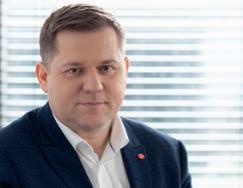
INNOVATION
Digital Poland foundation seeks leaders in digital
transformation
Dariusz Kwieciński, Chairman of the Digital Academy, discusses the importance of Digital Shapers in driving innovation and change. Recognizing leaders who excel in technology, innovation, and leadership, Digital Shapers inspire progress in digitalization. The Digital Poland Foundation invites nominations for the 2023 title until February 25. Past winners like Wojciech Zaremba, co-founder of OpenAI, and Małgorzata Solowska, Director of ZSO No. 1 in Gdańsk, exemplify impactful contributions to digital transformation. As AI continues to drive innovation, identifying and honoring leaders in digital change becomes increasingly vital for shaping a more innovative future.
2 mln
users of PKO Bank Polski’s online currency exchange (PKO)
19,612
fully electric vehicles registered in Poland (over 50 % more than in 2022) (PSPA)
AI in Polish Firms according to AWS in CEE
23% of Polish companies have adopted AI technologies
94% of them report revenue growth
88% claim to see more innovation
81% see improved processes
44% have limited AI provider options
WBJ.PL 57
ALL IMAGES THIS SPREAD SHUTTERSTOCK
Life + Style

IN THE BAG
'Tis the season of blooming flowers and fresh beginnings, and Designer Outlet Warsaw is your ultimate destination for a springtime shopping extravaganza. Immerse yourself in a world of fashion and explore over 130 prestigious brands offering discounts of up to 70%. Discover the perfect handbag to complement your spring wardrobe and add a touch of sophistication to any ensemble
For more, visit wbj.pl


WBJ.PL 59
(Left)
Karl Lagerfeld sweater
PLN 779 now PLN 529, Pants Pinko PLN 1,420 now PLN 935, Pinko jacket PLN 2,289 now PLN 780, Bag
Tous PLN 749 now PLN 359
(Right)
Liu Jo sweater PLN 889 now PLN 445, Pants Max
Mara/Made in M PLN 779 now PLN 269.50, Shoes Hogl PLN 699 now PLN 499, Bag Furla PLN 1,614 now PLN 979
(Opposite page)
Pennyblack/Made in M blazer PLN 1,279 now PLN 444.50, Skirt Ochnik PLN 299.90 now PLN 169.90, Tights Calzedonia PLN 15.99 now PLN 11.99, Bag Pinko PLN 1,120 now PLN 740, Davi bracelet PLN 189 now PLN 129
Life + Style

MALTA'S AMBITIOUS PUSH:
Attracting Polish Tourists Year-Round
From TV Collaborations to Fresh Taglines: Inside Malta's Strategies to Entice Polish Visitors, Drive Sustainable Growth, and Foster Cultural Exchange
WBJ: Can you share some insights into the initiatives or strategies that Malta is currently employing to attract more Polish visitors, especially considering the ambitious goal of reaching 200,000 tourists from Poland annually?
John Mary Attard: Our strategy is anchored by a great message: Malta is a year-round destination with 300 days of sunshine. Encapsulated in our slogan is the idea to "Explore more...". Our strategy is based on three core elements: geographical planning, demographic targeting, and motivation-driven marketing. With this new tagline, we can now focus on distinct segments, catering to the varied interests of our audi-
ence across different markets and at different times of the year.
We will aim at maintaining a comprehensive 360-degree marketing approach, covering every part of a customer's journey and interaction with our brand. This entails utilizing various marketing channels, online and offline, to deliver a unified and consistent brand experience. Our goal is to offer personalized, targeted messages to potential customers through multiple touchpoints. We are executing this strategy on many levels.
Firstly, we are talking to airlines such as Wizzair and Ryanair to open more flights to Malta from major Polish airports. Thanks to our efforts, by the end of March people from 7
60 FEBRUARY - MARCH 2024 WARSAW BUSINESS JOURNAL
PRESS MATERIALS / MALTA TOURISM AUTHORITY (MTA)
Polish airports (Warsaw-Chopin, Warsaw-Modlin, Kraków, Wroclaw, Gdańsk, Poznań, Katowice) can fly to Malta every week. There will be more opportunities to see/experience Malta in the "dead" season of winter rather than during the summer holidays.
Secondly, we are developing cooperation with major tour operators. By the end of 2023, we joined forces with Wakacje.pl, the biggest online and offline travel company. At the beginning of 2024, we started cooperation with another big travel brand - Itaka. However, we recognized that this alone was not sufficient. We also started engaging influencers to visit and experience Malta and then share their experiences with their communities and followers.
It's also worth mentioning the TV projects. Last year, in collaboration with ESKA TV, which is the most important brand among TV channels for Polish Gen Z, we produced the Maltese edition of the program "ESKA on the beach". At the end of 2023, viewers of the WP TV channel enjoyed a Maltese episode as part of the new season of the program "Jedziemy na wakacje." This episode was made possible through our partnership with Wakacje.pl and the WP TV channel (Wakacje.pl being part of the Wirtualna Polska media holding).
From the 25th of February, on the Canal+ Kuchnia TV channel, you will be able to watch "Jakubiak rozgryza Maltę", another TV production that we launched last year. All of this is producing tangible results. According to data from Wakacje.pl and Travelplanet, Malta ranks as the third most popular winter destination for Poles in 2024.
Now we can announce that the year 2023 was a special period in the history of Maltese tourism. A psychological threshold was crossed in terms of the number of tourists who visited our country. More than 3 million people visited last year. Compared to 2019 - a record year for Mal-
tese tourism - this was an increase of more than 8%. More foreign visitors also meant more income for the country's budget. In 2023, tourists injected €2.7 billion into the Maltese economy - 20% more than in the aforementioned 2019 (€2.25 billion). More than 167,000 Polish tourists visited the Mediterranean country last year. Compared to the pre-epidemic period (2019), this was one of the two largest increases (60%) with 63,000. Only Italy recorded a larger increase (155 000). Poland is once again one of the top 5 European countries in terms of tourist traffic to the Maltese Islands. This makes the pillars of our tourism development more diversified and therefore more stable and healthy.
What aspects of Malta's offerings do you believe resonate the most with Polish tourists? In other words, what are Poles typically seeking when choosing Malta as their travel destination?
Regardless of the time of year, Malta has a lot to offer. Basically, it's the one place in Europe where it's almost always sunny and warm (from October to May). With a flight time of just 2-3 hours, Malta is conveniently close for Polish travelers. Additionally, the Mediterranean allure holds a strong appeal for Poles, who are drawn by the region’s reputation for good weather, proximity to Europe, along with the opportunity to explore diverse attractions and savor local cuisine.
In summer, Poles flock to Malta for sun-soaked beach holidays, particularly in the northern part of the island. Many also come to experience events like the Isle of MTV Malta. During spring, Malta attracts Polish visitors seeking religious experiences or eager to explore the filming locations of popular movies such as Napoleon, Gladiator, Troy, and Game of Thrones. The allure of Malta's cinematic settings continues to grow, with the island set to host
For more, visit wbj.pl
“Malta's allure transcends seasons - we're more than just a sun and beach destination”
the filming of Gladiator 2. Active holidays and visits to Gozo, a sister island of Malta, are in turn driving forces in attracting Polish tourists, especially in the current winter months.
If it's possible, they like to take a short break (a few days off) and go to Malta to discover new things. Malta is at the crossroads of Europe, North Africa and the Middle East. We're Christian but our language comes from the Semitic family. We're bilingual (Maltese/English) and our food is mostly rooted in the Middle East. We're a small country and the most LGTBQ+ friendly place in the world. As a former part of the British Commonwealth, we also offer great holiday English schools. I think Poles choose Malta because it's an open place: for singles, couples, families, pilgrims and architecture lovers.
Malta seems to be drawing interest from Poles looking to invest in housing or second homes. Could you elaborate on the possibilities and incentives available for Poles interested in real estate investment in Malta? The impact of tourism on other sectors is enormous. It is worth mentioning that 30% of GDP is generated by it. So it also affects the growth of real estate. A lot of people are investing in renovating and opening boutique hotels because that's the future of the sector.
Another promising aspect is the rise of remote workplace business models. With an increasing number of IT/ tech companies implementing benefit programs that include 'remote offices' for employees, Malta emerges as an attractive destination. Imagine working for an IT/tech company that offers
WBJ.PL 61
PARTNER SPOTLIGHT
you the opportunity (especially in autumn or winter) to travel to Malta and work from a charming residence, enjoying delightful weather with sunny and warm days.
Malta has excellent connectivity with various parts of Poland. With the increasing popularity, do you anticipate any challenges in managing the growing interest, especially on an island with limited land resources?
A few years ago, the Maltese Ministry of Tourism set a target for the number of inbound tourists. It's around 3.5 million visitors per year. In order to manage year-round tourist traffic, we are focusing on building our position as a year-round destination. Another thing is that Malta isn't just a sun and beach destination. That's true, but it's only part of the tourist experience that this country can offer.
That's why we are developing specialties like religious tourism, screen tourism, gastronomic tourism, LGBTQ+ tourism. To underline how important the gastronomy sector is to us, in January we appointed Joséf Bonello as wine ambassador for the Maltese Islands. His mission is to create a brand identity for the wines of Malta and Gozo, and the Mediterranean, through his vast experience (over 30 years) and love of wine.
We also organized the first Mediterranean Tourism Forum in Valletta at the end of last year. Together with our colleagues from Croatia, Cyprus, Egypt, Greece, Libya, Italy, Palestine and Spain, we launched a joint initiative to build sustainable tourism through collaborative actions and to promote the Mediterranean as a great tourist destination. At the onset of 2024, we embarked on the second phase of the 2021-2030 Tourism Strategy, which is centered on reimagining the tourist experience through a quality tourism approach. Central to this strategy is the emphasis on sustainable tourism, which serves as one of its key pillars.
Life + Style

Given the trend of workation and international job opportunities in Malta, have you observed an uptick in the number of Poles considering permanent relocation to Malta? If so, what factors are driving this shift?
According to the latest data from the Maltese Ministry of Finance, there are 106,000 foreign workers in Malta. It's a big number when compared to the total population of Malta (about 500,000 people). About 2,000 of them are from Poland. As many Poles are returning to Malta, some of them are deciding to stay longer or permanently. The post-COVID effects, including the increased popularity of remote work, could serve as a catalyst for attracting more affluent Polish individuals to Malta. Initiatives like the Polish Pavilion at the Malta Art Biennale 2024, scheduled to open in March, are expected to further bolster this trend.
In 2024, sustainability and ESG considerations are prominent. As an island, how is Malta addressing the challenges associated with sustainability? Are there specific initiatives or policies in place to ensure responsible tourism and environmental preservation?
By sustainability in tourism, I mean, first of all, tackling seasonality. We can no longer think of tourism as a "temporary" sector with temporary jobs. That's a dead end at the moment. Tourism should be managed on a year-round basis. That's why Malta decided to become a yearround destination.
Any new investment related to the construction of hotels or resorts in Malta must comply with strict environmental restrictions. We are also encouraging the hospitality industry to invest in green solutions. Moreover, Malta will invest EUR 700 million in green spaces by 2030. Nature and green recreational areas will become green lungs for urban centers. This will make Malta a green Mediterranean archipelago.
Interviewee
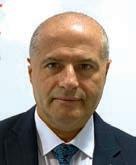 John Mary Attard, Regional Director of the Malta Tourism Authority, Warsaw office
John Mary Attard, Regional Director of the Malta Tourism Authority, Warsaw office
62 FEBRUARY - MARCH 2024 WARSAW BUSINESS JOURNAL

EVENTS
The WBJ relives or looks forward to the most important events in the world of business and economy
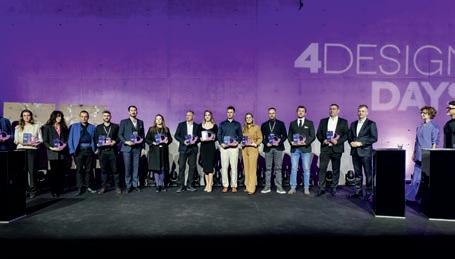
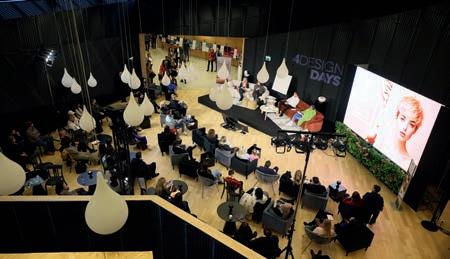
THE 8TH EDITION OF 4 DESIGN DAYS HAS COME TO AN END, LEAVING IN ITS WAKE NUMEROUS SIGNIFICANT CONCLUSIONS
The 8th edition of 4 Design Days, held from January 25 to 28, 2024, at the International Congress Centre in Katowice, boasted impressive figures: 4 days of events, 75 debates, 350 speakers, 120 exhibitors, and 14,000 participants. Beyond facilitating substantive discussions and conclusions, the event provided a platform for networking, knowledge exchange, and skill trading. Exhibitors showcased their latest innovations, products, and design trends, including energy-efficient solutions, furniture, smart home technologies, and premium real estate. The event's business component attracted numerous professionals who capitalized on the opportunity for meetings and discussions. Additionally, it featured Property Forum Śląsk, a significant fringe event focused on commercial real estate. Discussions among local government representatives, investors, and developers centered on Silesia's investment potential and ways to contribute to its development. Overall, 4 Design Days served as a hub for industry professionals to explore new ideas, forge partnerships, and discuss the future of design and real estate in Poland.
EEC TRENDS 2024 –A BRIEF SUMMARY
EEC Trends 2024, held in Warsaw on February 8, featured 11 debates with nearly 100 speakers, 100 journalists, and 1,100 participants. Discussions revolved around pressing economic issues. This event serves as a precursor to the European Economic Congress, scheduled for May 7-9, 2024, in Katowice, known as Central Europe's largest gathering of its kind.
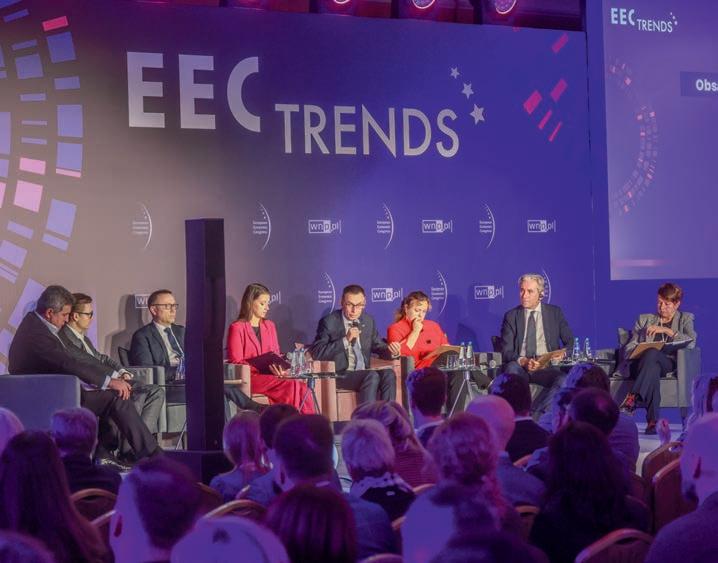
64 FEBRUARY - MARCH 2024 WARSAW BUSINESS JOURNAL
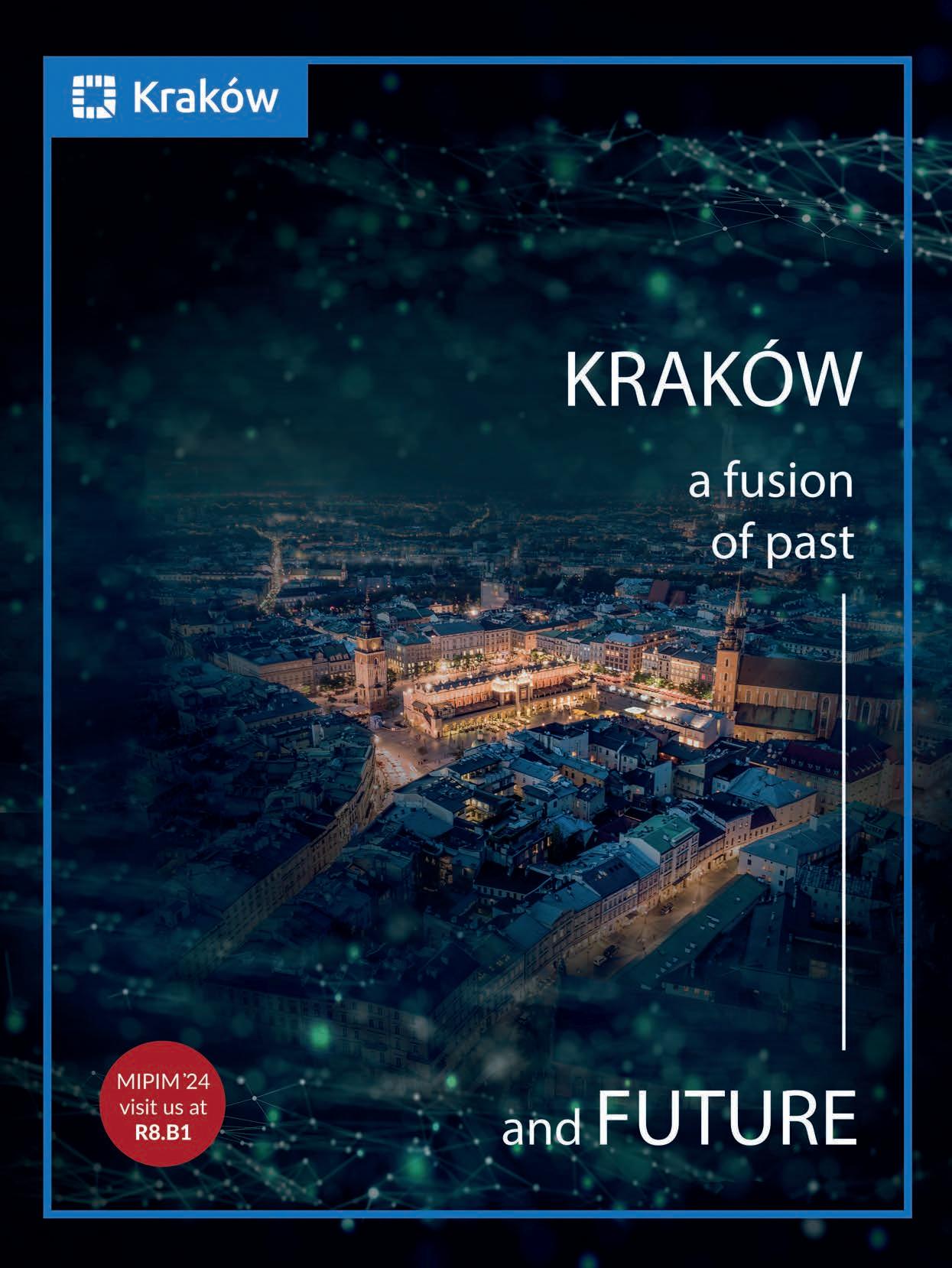







































































 Maja Kierzek-Piotrowska
Maja Kierzek-Piotrowska



















 John Mary Attard, Regional Director of the Malta Tourism Authority, Warsaw office
John Mary Attard, Regional Director of the Malta Tourism Authority, Warsaw office





